Text
Four Years Later
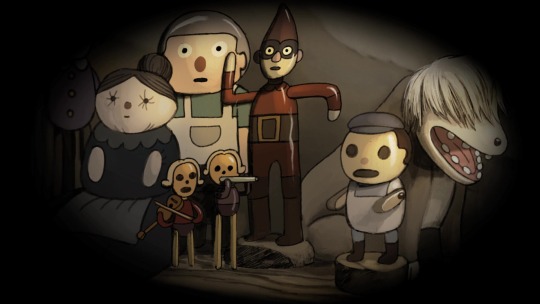
Hi y’all! Today marks the fourth anniversary of my first post in this project, and I wanted to thank everyone who’s read through it (again (again (again))). Life is good! Just hit my first year at the "new" library, and prepping for the annual rewatch with my wife later in the fall (adult readers: consider pairing the show with mulled wine). Time flies!
Fourth anniversaries sorta feel like a drumroll to the Big Five; after all, I wrote these reviews for the fifth anniversary of the show, meaning it'll be the Big Ten for Over the Garden Wall next year! But it's the length of a presidential term, the span between leap years, and your average stint in high school or college. Plus in just three months this blog will have existed for longer than the Confederate States of America managed, which really puts the racists who claim it as their Very Important Heritage in context. Wirt's Union jacket approves!

I hope today's readers have an excellent Labor Day weekend, and future readers can think fondly on excellent Labor Day weekend memories. As ever, take care!
16 notes
·
View notes
Text
Three Years Later
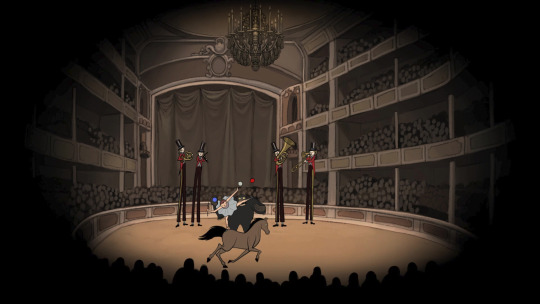
Hi y’all! Today marks the third anniversary of my first post in this project, and I wanted to thank everyone who’s read through it (again (again)). Man, what a year! Got married to my favorite person, we're back in the East Coast, just started a new job, and this October said person and I will be watching Over the Garden Wall once again; it'll be my eighth autumn with it, and her second, although she's been wanting to rewatch all year because spoiler alert she's a huge fan. Even roped in a few of her friends to catch Wirt Fever.
Not much to report on show update terms. Patrick McHale co-wrote the upcoming Guillermo del Toro stop motion Pinocchio movie where the story takes place in Fascist Italy, so that oughtta be weird! It has, as always, been a blast to get the occasional notification that folks are reading the archives throughout the year. COVID finally got me for a spell despite vaccinations, but it didn't hit too hard and somehow my wife still dodged it, so I suppose my sentiment til next September is to keep safe and healthy and don't take those things for granted! And as always, take care!
14 notes
·
View notes
Text
Two Years Later
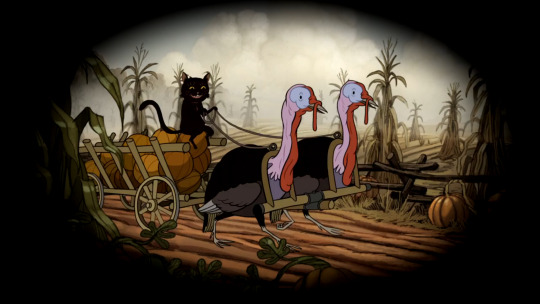
Hi y’all! Today marks the second anniversary of my first post in this project, and I wanted to thank everyone who’s read through it (again). It’s also been about half a year since I wrapped up Steven, Universally over on the other blog, and hoo boy have those months been eventful. Got engaged, got a dog, and moved to a new city for the first time in my adult life, all while the pandemic still just sorta keeps happening. Makes a guy wonder what the third anniversary will be like.
The fiancée watched and loved Steven Universe (not a dealbreaker if she didn’t, she’s pretty terrific, but it’s a heck of a bonus) so I can’t wait to show her Over the Garden Wall as soon as things stop being stupid hot. As Florence Welch ostensibly says every September First, the dog days are over, so here’s to hot chocolate and sweaters in our near future. Take care, folks!
22 notes
·
View notes
Text
One Year Later
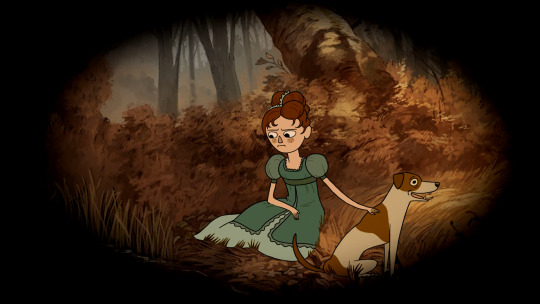
“Dancing in a swirl of golden memories.”
Hi y’all! Today marks the anniversary of my first post in this project, and I wanted to thank everyone who’s read through it; I’ve gotten smatterings of notifications from this blog throughout the year, and it’s so cool to see folks enjoy it long after its completion. Only one major edit has been made since, and recently: with the passing of Joe Ruby in August, the introduction to Mad Love has been updated to note that he’s sadly no longer with us. Other than that, not much to add on the news front for a long-finished miniseries.
I hope you’re all doing well in a time where the unknown is scarier than it has been in quite a while. I structured Going Over the Garden Wall around two moments in my twenties when job insecurity fueled some of the worst depression in my life, and considering around half of the year since last September has occurred during a plague, I’m sure way too many folks now know how that feels. Every case is different, so I won’t pretend to understand what each individual circumstance is like, but if you’re struggling in the long term without knowing what to expect over the horizon, know that I’m rooting for you!
Over the Garden Wall won’t fix all your problems, but it’s times like this that I’m glad stories like it exist. Things might not always work out as well in the real world as they do in a cartoon, but even though it’s hard, I hope that when life is mucking up your path that you remember to eat your dirt. It might not taste good, but once you’re through it, life does get better. Good luck out there, and let this librarian know if you need any book recommendations to tide you over!
29 notes
·
View notes
Text
Chapter 10: The Unknown
Life will always have its share of dirt. Mucking up situations that should be clean, obscuring the right path forward, piling up little by little until it threatens to bury you if you’re not careful. Part of growing up, maybe the biggest part, is figuring out what you’re going to do about it.
The Unknown presents two options. The first is sung by the Beast as he serenades Greg’s weakening form, heard as the Woodsman slowly enters the woods, first as purely diegetic music but soon joined by piano and strings:
“Sorrow and fear are easily forgotten when you submit to the soil of the earth.”
The second option comes from a surprising source, a character who never interacts with the Beast but whose advice is good enough that when push comes to shove, knowingly or not, Wirt takes it. It might not be phrased with the elegance of the Beast’s lyrical argument for surrender, but that doesn’t stop it from being Over the Garden Wall’s most important lesson:

“Eat your dirt.”
There isn’t a simple dichotomy between letting problems consume you and consuming problems: after all, actively seeking misery isn’t great for you. And The Unknown provides two major examples of why the generic “never give up!” message on its own is ultimately flawed: Greg and the Woodsman’s determination is noble at its core, but it blinds them to the reality that the Beast is deceiving them. With conviction must come critical thinking and self-awareness, because it’s otherwise impossible to break stubborn bad habits and seek healthier ways to solve problems.
In other words, the best way to handle difficulty is to fully digest it and grow stronger from it, rather than shovel it in and get sick. Don’t gorge on your dirt, but don’t submit to it, either. Just eat it.

While his long-running trick to keep the Woodsman in his thrall may be the Beast’s cruelest lie, the one that hits harder for me is his method of trapping Greg. We don’t need to see Greg’s adventures to understand the fairy tale logic that drove his quest, where a brave child is given three impossible tasks and overcomes them using his wiles. The Beast gives Greg victories to build his confidence, and those victories are based on guile, allowing Greg to feel like he’s got one over on the villain. Our hero is already in a bad way, and it’s heartbreaking to see him persevere like the Little Match Girl as the cold intensifies.
This message is fittingly hidden in an episode that showcases the full obfuscating power of the Beast. He’s able to twist truth and tropes alike to fit his needs: even something as basic as light representing the known and darkness representing the unknown gets warped, as the episode opens not in the usual shadows of the woods but a blindingly bright snowstorm. The Beast may be a creature of darkness, but this allows him to hide that his soul is a brilliant light. There’s an inescapable feel to the Beast’s machinations: neither the light nor the dark can save you from his lies.
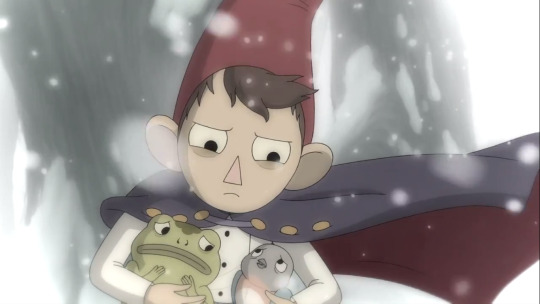
We waste no time reuniting Wirt with Beatrice, and while we’ve had little time with the latter since Lullaby in Frogland, her search for her friends in the past few episodes is all we need to see to understand her desire to make things right. Wirt remains upset with her despite knowing that she saved his life, but is able to see the same fierce resolve to help that spurred him into the snow. Both of them are fueled by guilt and the need to make things right, so after a brief pause that speaks to how much her betrayal still hurts, Wirt takes her along and offers his thanks.
The third piece of the equation is introduced at the old grist mill, scrambling for more wood and finding the cracked stick he tossed away in our first episode. Like Wirt, the Woodsman is determined to save a loved one, and like Greg, his stubbornness allows him to be duped by the Beast. As a man who embodies both of the boys’ struggles, it makes sense that it’s from his perspective, not Wirt’s, that we first see the consequences of his actions. The singing that has haunted us since Songs of the Dark Lantern transitions to an eerily serene children’s choir as Greg is revealed to be covered in branches, and the horrible truth of the woods is made clear: like the suicides in Dante’s Inferno, the lost souls of the Unknown become trees.
What follows says everything about the Beast and the Woodsman alike. The Beast argues that his servant would have chopped the trees down even if he had known, assuming the worst in humanity, but even this reeks of more deception: if he truly believed that the lie was unnecessary, why lie in the first place? Either he knew that there was a risk in telling the truth and is manipulating the Woodsman now, or he had full faith that the Woodsman would do the unthinkable to help his daughter and is now reveling in his misery. Either way, the Woodsman’s doesn’t second-guess himself for a second, rushing to help Greg regardless of the consequences and renouncing his actions without hesitation. He meets every attempt at placation with fury, and shows that for all his faults, he truly did want to make the world a better place.
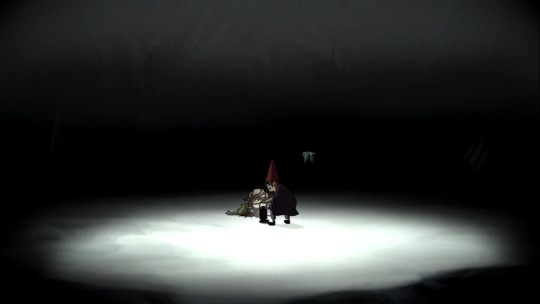
Only after the Woodsman and the Beast leave the scene do Wirt and Beatrice find Greg, guided by the same lantern that indirectly caused the kid to get captured in the first place. It’s a harrowing scene even when you know everything will work out okay, but it was especially disconcerting in first viewing: looking at it from a big picture, it was always unlikely that the show would actually allow Greg to die, but it was still possible, considering how close to death the boys are in the real world, how close to death Greg is here, and that Over the Garden Wall was already established as a finite miniseries with this episode as the conclusion. Greg coughing up leaves might be waved off as a joke, showing that he’s still got that childish sense of silliness, but it’s still a gruesome image given the circumstances. The Latin translation of Potatoes and Molasses sung in the background sounds like a ridiculous idea on paper, but turning a joyous highlight of Greg’s journey into a dirge that’s subsumed by the same eerie children’s choir as the Beast’s song works horrifically well.
But what sells the scene more than anything is the acting. Collin Dean layers Greg’s signature earnestness with exhaustion and pain, wringing sincere emotion from lines like “I’m a stealer” (which isn’t a bad line, but requires an actor of Dean’s skill to not come across as distractingly cutesy). Melanie Lynskey only has one major line in the scene, but her frantic confirmation that leaves are growing inside Greg amplifies the horror without gilding the lily, which isn’t easy when a character is telling us what we’re already seeing. But the absolute knockout comes from Elijah Wood, barely holding Wirt together as he struggles to comfort and free his brother. The guilt over getting Greg into this mess seeps out as Wood’s voice cracks and he forces himself to present a reassuring front.
Even this conversation, where Wirt owns up to his mistakes and takes responsibility for wronging Greg, is shrouded by the miscommunication that has plagued these characters throughout the series. Beyond the false alarm of Greg’s leaves, Wirt thinks Greg is apologizing for all the things Wirt blamed on him, when in fact he’s apologizing for stealing the Rock Facts Rock. Which adds an extra layer of tragedy when Greg appears to succumb after the brothers hit the same wavelength at last, after Wirt, not Greg, gives their frog a proper name.

Like Greg in Babes in the Wood, Wirt isn’t frightened when he first meets the Beast: both brothers are more focused on how to help the other when introduced to the show’s villain. Wirt’s concern is so great that he dismisses the Beast outright until he’s offered a deal to help Greg, and we see that as much as he’s grown, the old Wirt is still a part of him. For a moment, he allows hopelessness to guide his actions, assuming as he has before that things won’t turn out well. But that signature dithering makes a triumphant return as he changes his mind, impetuously calling the Beast’s plan “dumb,” because at long last he’s gained a greater sense of awareness. A version of Wirt as trapped in his own head as he was in Into the Unknown might’ve taken up the Woodsman’s burden, but this version of Wirt is finally wise enough to not believe his lies.
The Beast’s game is up the moment Wirt stumbles onto the lantern’s secret. Sure, he can put on a terrifying display of darkness, but a monster powered by deception is powerless against the truth. The Beast may succeed in scaring Wirt, but even if his voice cracks the first time around, all it takes is confidently calling a bluff to render the Beast helpless. And I love that this defeat ends all of the deception in the scene, even Wirt’s: he’s putting on a show when he tries for a badass one-liner before blowing out the lantern, but his derisive “pfft” at the Beast’s pleas is legitimately badass. What’s more, his secret possession of Adelaide’s scissors is revealed, the Woodsman realizes that his daughter’s soul was never in the lantern, and the Beast, already defeated, has his true form cast into a harsh light for one last scare.
(I’m not including the image because I think his true form has a lot more power as a glimpse, so here’s a picture of what happens next.)
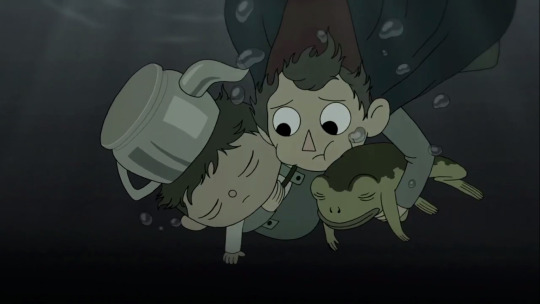
The ambiguity of our return to the real world is something I cherish too much to try and make definitive claims over the “actual events.” Attempts to decipher the true nature of the Unknown sorta miss that the place straight-up tells you what it is by name. We can’t know whether it’s an alternate dimension or a dream with weird real-world implications or a time warp or literal magic or whatever, and it frankly doesn’t matter. What matters is that when Wirt awakens, he rushes down to Greg instead of swimming up: regardless of what happened or didn’t happen in the Unknown, Wirt has transformed from a child who blames others for everything to a young man capable of selflessly saving a life.
Shirley Jones’s voice breaks me as we see these kids struggle to survive the aftermath of their near-drowning, adapting Beatrice’s theme to a lullaby as her false promise to take the boys home is fulfilled. Yes, we see the bell ringing within Jason Funderburker as Jason Funderberker confuses his relevance in the story, but it’s more important that Wirt calls the frog “our frog” and works up the nerve to ask Sara out. Greg is back to his old self, happy as a clam, and Wirt has one last moment of babbling to show he hasn’t grown all the way out of his confidence issues. Even if we don’t know what the future has in store for them, we at least get the sense that everything is going to be okay as our second Jones takes the stage.
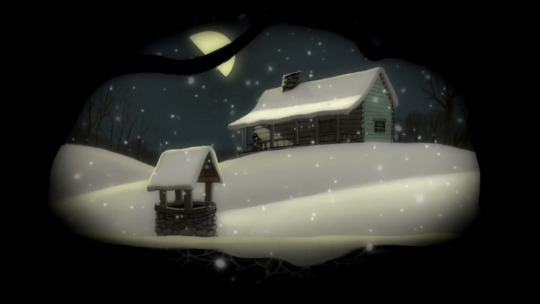
Jack Jones’s final montage shows the scenes that began our journey resolving in reverse order, with three endings in quick succession: Beatrice’s family restored, Jason Funderburker revealed as the singer, and Greg returning the Rock Facts Rock. Any one of these could work as the show’s true ending, as all three involve a different form of truth prevailing. Beatrice’s family is back to their true forms, and her mother tells us a truer means of dealing with dirt than the Beast ever did. The frog’s identity wasn’t much of a secret when given a little thought, as Jack Jones provided his singing voice in Lullaby in Frogland, but confirmation is still gratifying as the show’s final “mystery” is solved. And Greg represents “truth” in the sense of being true to oneself and just to others, while at the same time ridding himself of a tool he used to tell fun fibs.
And yet, some mysteries remain. We have no idea what really happened with the Woodsman and his daughter, especially because he’s apparently been grinding up trees for years. Considering Beatrice’s family seems to live at the mill, does this mean they’ve also been birds for years, or did the Woodsman only recently take it as a means of production? What’s up with the black turtles? Are the frogs on a wind-up toy steamboat launched by two boys? Questions abound without answers, and it’s okay that we don’t have them. Accepting that certain things will always be unknown makes it easier to move past our fear of it, a skill that none of us will ever need to outgrow.

I can speak firsthand to how tempting it is to let the weight of the unknown overcome you. In 2014, after realizing the path I’d committed to for years wasn’t going to end where I'd hoped, when I had no idea what the future had in store and the unknown was an overwhelming burden, the depression that had consumed my teens burst back into my life. I was incredibly fortunate to have parents willing and able to take me in, because I sincerely don’t know what I would’ve done to myself otherwise.
I spent the fall and winter with them as I tried to regain my bearings, but it took another stroke of fortune to really pull me back from the brink. Friends in New York offered me an open room in their apartment in March of 2015, and it’s impossible to overstate how much that shaped my life: hunting for apartments is hard enough without crippling despair, and it spurred me to get back to something resembling my old life. I started working at another bookstore, this time full-time, and in March of 2016 I applied to graduate school to become a librarian.
I was a school librarian part-time for the next two years as I went to library school, and absolutely loved it. I figured this would be my new path, but it turns out I wasn’t done with misplaced goals. Red flag after red flag sprouted up in the summer of 2018, and I was burnt all the way out after grad school and the grueling teacher’s licensing program, so I ended up turning down a sketchy-looking but secure job before the start of the schoolyear. I assumed I’d be able to find a public library job soon enough, a job that would allow me to work with other librarians rather than acting as a one-person library department: I had years of experience, I graduated from a school with a good local reputation, and I just plain knew what I was doing when it came to working with kids.
It wasn’t until March of 2019 that I finally landed at the job I have now. That’s a very short sentence for another very long fall and winter in my life, with numerous false starts and empty promises and a return to the feeling of total failure from 2014, now with the bonus of intense graduate school loans. It took two more existential crises than I would’ve liked, but I found my place and my people just in time for my twenties to finally be over. The dirt didn’t stop coming after my first career misfire, and I’m sure it won’t stop after the latest one, but I can’t tell you how grateful I am that I didn’t submit to the soil of the earth.
Eat your dirt, folks. Take care.
102 notes
·
View notes
Text
Chapter 9: Into the Unknown
A boy named Mark was born on April 26th, 1976, fourteen years and one day before a boy named, uh, me. We’re both Virginians, but he moved to Florida as a kid while I stayed in the Old Dominion through college. Summers in Virginia are hot and humid and full of mosquitoes, which is why I love winter so much, but summers in Florida are so much worse. Despite that, Mark was an outdoorsy kid, and his adventures along the water inspired a literal dream he had around the time I was born about going on adventures across the seas, a dream that saw him start to make up stories about this alternate self. (I had nothing to do with it, we’ve never met and even if we had I wasn’t a particularly inspirational baby, but after so many introductions about animators of the past, it’s neat to think about how recently this last bit of history spans).
Mark moved to Utah in high school, and his swashbuckling appearance and attitude reminded his new classmates of Thorpe, Errol Flynn’s character in The Sea Hawk (as one of my sources helpfully notes, the reference to a 1940 film is likely due to the more conservative leanings of early 90s Salt Lake City making older films movies more popular). It’d be weird enough for “Thorpe” to become a lifelong nickname based on this tenuous connection, but the nickname Mark ended up with is actually a mispronunciation of name that I guess nobody felt the need to correct. High school, am I right?
Thurop Van Orman began his career in animation as an intern at Cartoon Network, and parlayed that into storyboarding gigs for The Powerpuff Girls and The Grim Adventures of Billy and Mandy. He learned from the likes of Craig McCracken as he honed his idea into a pitch for a show about a kid like him who loved capers on the high seas, and in 2008, the stories inspired by his childhood dream became a cartoon. For two years and three seasons, The Marvelous Misadventures of Flapjack not only entertained with its hilarious and surreal escapades, but incubated a crew of animators that shaped the 2010s.
J. G. Quintel, creator of Regular Show? Flapjack alum. Peter Browngardt, creator of Secret Mountain Fort Awesome and Uncle Grandpa? Flapjack alum. Alex Hirsch, creator of Gravity Falls? Flapjack alum (who brought Thurop in to voice the villainous Gideon). Pendleton Ward, creator of Adventure Time and Bravest Warriors? Flapjack alum, and his continuation of the Flapjack style of storytelling, where writers doubled as storyboarders, would shape Adventure Time alum Rebecca Sugar’s own methodology as she created Steven Universe. This would not be Thurop’s only “grandchild,” as the likes of Bee and Puppycat, Clarence, OK K.O., Summer Camp Island, and Infinity Train were all created from alums of shows created by Flapjack alums, and we’re even starting to see great-“grandchildren” like Craig of the Creek and Victor and Valentino.
But I left out one Flapjack alum who worked with Ward to develop Adventure Time from a viral short with a ton of potential into a sustainable television show, becoming the show’s creative director for the first two seasons. His name was (and still is) Patrick McHale, and in October of 2011, he started working on a pilot of his own.

“The river runs cold, the fight is over; still, the haunted ruins of night call your name.”
A trope that I’ve never been fond of when it comes to twists is when flashbacks are used to remind us of the foreshadowing or give old scenes new context. It can work in the right circumstances, but more often than not it shows a certain lack of trust, either in the audience for not paying attention or in the material for not being memorable, and it sucks the joy out of rewatching the story to catch hints for yourself. I much prefer a twist that maybe gives us a moment to take it all in (which is frankly pretty easy to do, all it takes is a character who’s as stunned as we are to allow us that time to process), and believing in us to understand the ramifications of this twist on our own.
Into the Unknown thrives in its bluntness. There’s no attempt to be clever about the reveal that Wirt and Greg are of our world in the late 20th century, we just begin right away with Wirt wearing semi-modern clothes in a semi-modern bedroom fumbling with a semi-modern cassette, all to the backdrop of a semi-modern-sounding song sung by Pat McHale himself. His actions are confusing at first to match our own initial confusion, creating the outfit we’re familiar with by taking the coat from an old-timey uniform and cutting the fluff off a Santa hat and putting on a fan to let his cloak billow in the wind (it helps that we already know he’s a weird and overdramatic kid). But our questions answer themselves with time: it’s Halloween, Wirt’s planning on giving his crush a mixtape, and Greg's series-spanning kettle hat is just his glorious take on an elephant.
This is Wirt pre-development, so he’s back to the dithering and the abysmally low confidence and the open hostility towards Greg; the last of these makes a comeback when he reaches peak despair, but even while depressed he's moved beyond the crippling indecision of his early adventures (although certainty in one’s looming demise isn’t much better). Still, even this early on we can see that he’s not a lost cause. He might get lightly teased by the first teens we see, but his appearance at the party reveals that he’s liked by plenty of his classmates, and Sara’s mutual crush is immediately obvious: his biggest enemy is his lack of self-esteem. And while he loses his nerve as soon as he sees Sara the Bee, this wouldn’t be possible if he didn’t have nerve in the first place: the beginning of Into the Unknown, and thus the first chronological moments that we see of Wirt, shows him getting out of a funk to take a genuine risk, one that fully merits him dropping the episode’s title on us.
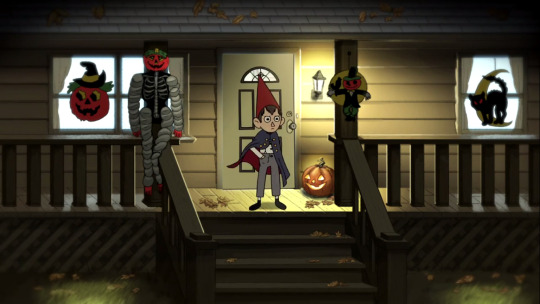
The pursuit of Sara the Bee shifts us wildly from the dark atmosphere of the Unknown to classic teen comedy territory, where one crazy night can change everything. The stakes are fully personal for the bulk of the episode: Wirt needs to get his tape back to avoid embarrassment, and Greg wants to get the tape back so Wirt will hunt frogs with him. I like the detail that Wirt’s been flaking out on his promise and that Greg almost gets that he’s being blown off, but clings to that childish hope as he bulldozes through the barriers Wirt puts up for himself. Greg is first seen as a helper, doing chores for Mrs. Daniels for the candy he’ll use to make a trail in The Old Grist Mill instead of trick or treating, which implies a certain level of neglect: nobody’s around to take him door to door to get candy the proper way, and we don’t see him interact with any kids his age.
That said, the mood of the episode is definitely more mellow than melancholy, with Wirt’s awkwardness earning laughs and cringes in equal measure. Sara is delightful as she assures Wirt (and parents in the audience) that the teens are gonna drink age-appropriate drinks and do age-appropriate stuff, and she’s got the best costume game of anyone, first as a mascot and then as a skeletal clown. The cops try for humor as well, and while it’s funny for us, their position of authority makes them terrible at telling jokes in a way that will come back to haunt us. This is the last bit of levity before the finale, and unlike Babes in the Wood, hindsight never taints its goofiness. Particularly because the greatest joke of the episode, and perhaps the series, is far more upfront about its larger story implications than Greg’s magical dream.
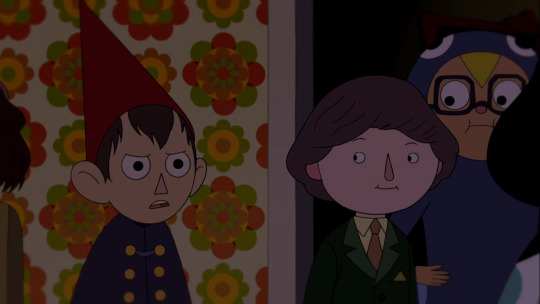
Jason Funderberker is an oddly central character in Over the Garden Wall, a figure of dread established midway through the series as Wirt’s impossibly perfect romantic rival and the eventual namesake of Jason Funderburker. We confirm that Jason is a big deal when Wirt talks to the girls at the big game; sure, most of the impact comes from his outsized reaction, but Jason is still presented as serious competition for Sara’s heart. After going full crisis mode at the thought of Jason and Sara listening to his tape, we get a red herring of sorts in Jimmy the Jock. He certainly fits the “total package” bill that Wirt promised: a kind hunk who clearly respects women’s boundaries but warns Wirt off spying on Sara rather than trying to display his machismo through force. All signs point to a hopeless situation until finally, with perfect comedic timing, we meet the man in question.
It’s not just that Jason Funderberker is small and scrawny, or that his outfit and hair are pretty dorky (that said, let’s consider the source): it’s that damned voice. He’s given an absolutely perfect grating squeak from Cole Sanchez, yet another Flapjack alum who took over as creative director on Adventure Time after McHale moved to New York. The idea that this dweeb is the object of Wirt’s unending jealousy is an amazing punchline by itself, but as I said, the larger story implications are immediately clear, because there’s one thing that truly separates Jason from Wirt: confidence.
Jason might not be the most conventional ladies’ man out there on paper, but unlike Wirt, he’s capable of making a move. He’s as blind to Sara’s lack of interest as Wirt is to Sara’s active interest, but dammit, he tries. And he doesn’t even try in a gross or intrusive way, handling Sara’s implicit rejection well enough and ending up holding hands with his bespectacled admirer in our final episode. Literally all it takes for Wirt to “compete” with this guy is an ounce of self-assuredness, so it tracks that his journey through the Unknown achieves just that.
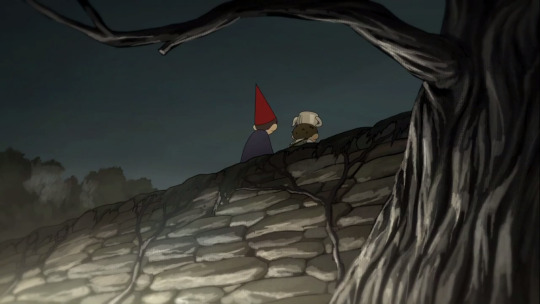
The Unknown might be another realm that these brothers have yet to face, but our understanding of it seeps throughout the episode. There’s the obvious reference to the show’s title as the pair climbs over the wall of the Eternal Gardens cemetery, and the grave of Quincy Endicott in said cemetery, but it’s also felt in the inability for Wirt to see the truth that he’s well-liked and that Sara definitely likes him back. It’s in the recurring bird imagery, with one girl dressed as an egg (who, and I noticed this for the first time in this watch, is voiced by Ashly Burch!) and another as a bluebird. It’s the fact that we’ve got disguises in general because it’s Halloween, considering the sheer amount of characters who aren’t what they appear in the Unknown: Enoch is really a cat, the gorilla is really a circus performer, the ghost is really a tea magnate, the huge singing frog is really our heroes huddled under a big coat, and the devourer is the sweet girl rather than the witch.
The most straightforward character, of course, is Greg. To be as fair to Wirt as I can be, his little brother does throw a wrench in things when he can’t stop giving the girls hints about Wirt’s crush, which sets off the chain reaction leading to what appears to be a disastrous night, so if you squint hard enough, Wirt isn’t wrong to blame the kid for his troubles. But without Greg, Wirt never would’ve gotten the courage to talk to Sara, and he certainly wouldn’t have entered the party uninvited. Greg’s willingness to engage perhaps needs to be tamped down in the same way Wirt’s needs to be amped up, as he has all the social skills of a little kid, but at least Greg has the excuse of, well, being a little kid.
More importantly, Wirt’s instinct to blame everyone but himself makes it impossible for him to see that he’s the one holding himself back. Acceptance and a relationship with Sara are right there in front of him, he just needs the courage to acknowledge it. Greg’s best bit of advice is that he join marching band, given he plays the clarinet anyway and it would allow him to spend time with Sara organically, but Wirt angrily dismisses the suggestion as interference while revealing that Greg’s father has given the same advice. It’s the second and final time we’re reminded that these two are half-brothers, but only now do we bring up that there’s distance between Wirt and his stepfather that seems to be one-sided. As per his song in our fourth episode, Greg was born after Wirt’s mom remarried, so his stepdad has been his stepdad for a significant period of time by now, but Wirt still venomously refers to him as “your stupid dad” as if he’s a stranger, even though the guy is ostensibly encouraging Wirt via his interests. Sure, there could be plenty more to this story that we’re not seeing, maybe the guy’s a huge pushy jerk, but Wirt’s refusal to consider good advice cements his inability to allow himself means of being happy, which of course ensures that he’s never going to be happy.
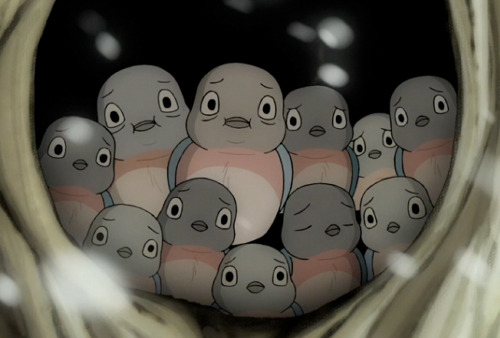
Which is what makes the ending of Into the Unknown so perfect. After finally finding their frog, the old black train whose whistle we hear at the beginning of nearly every episode nearly kills them, and as they tumble down a hill into the cold-running river foreshadowed by the episode’s opening song (and the opening sequence of the series), everything finally clicks into place: these boys are more lost than they realize.
But when Wirt awakens in the present surrounded by Beatrice’s family, he’s finally able to use the word “brother” to describe Greg. Over the Garden Wall began with a version of Wirt who failed to be heroic even when instructed to be, then moved to a version who could stumble his way through heroics on command, which evolved into a version who could perform heroics autonomously, but now we’ve gone above and beyond: this is a version who’s heroic even when others beg him not to be. We’ve wrapped all the way back around to disobedience, but this time it’s for the sake of helping others. And after dismissing and blaming Greg in the Unknown and the land of the living alike, it’s downright beautiful to see Wirt set off into the unknown once again, willing to put his life rather than his reputation on the line to save his brother.
Rock Factsheet
We come close to learning some valuable rock facts, but Wirt’s too distracted.
Where have we come, and where shall we end?
Beatrice’s mother appears only briefly at the end of the episode, but she’s voiced by musical legend Shirley Jones, and One is a Bird whispers its way out of the final scene. It was pretty much inevitable that Jones was going to sing it.
#into the unknown#over the garden wall#otgw#steven universally#thurop van orman#the marvelous misadventures of flapjack#pendleton ward#adventure time#patrick mchale
101 notes
·
View notes
Text
Chapter 8: Babes in the Wood
In this last hurrah of explicit homages to animation of the past, the most obvious discussion point is Merrie Melodies and its ilk: Babes in the Wood is essentially a full-episode reference to the bouncing musical shorts of yore, where everything can sing’n’dance and the villain is a blustery bozo who’s defeated with a sight gag. If we expand to children’s entertainment in general, as we did with Greg’s Beatrix Potter episode, then The Wizard of Oz is our logical next step: the song welcoming him to Cloud City owes everything to Dorothy’s introduction to Munchkinland, complete with the fact that our hero has just entered a dream.
And look, there’s nothing wrong with talking about the obvious. But as we near the end, I think it’s a little more interesting to instead explore the very beginning. So let’s go back to a newspaper cartoonist in New York—the one who inspired fellow New York newspaper cartoonist John Randolph Bray to become an animator, which in turn led fellow New York newspaper cartoonist Max Fleischer to become an animator, because it turns out that just like the birth of superhero comics a few decades later, the birth of American animation hinged on print artists who dreamed big in the city that never sleeps.
A boy named Zenas was born in Michigan on September 26, 1871. Or maybe he was born there in 1869. Or maybe he was born in Canada in 1867. He said one thing, and a biographer said another, and census data says another, and I wasn’t there. It’s similarly unclear when or why he started going by his middle name, but by the time he took his first job at age 21 (or 19 or 17) as a billboard and poster artist in Chicago, he was calling himself Winsor McCay. They sure did know how to name ‘em in the 19th century.
McCay began his newspaper career as a freelancer, but moved to New York in 1903 to work for the New York Herald, where he wrote a variety of comics before hitting it big with Little Sammy Sneeze. McCay’s art was always brilliant, but his gag work was formulaic to a fault: the joke for Sammy Sneeze was always the same, he would sneeze and ruin everything right before the last panel. That devotion to formula would continue in his second big comic Dream of the Rarebit Fiend, where a fantastical events would occur for ever-changing characters before the lead woke up in the last panel, revealing it was a dream.
That second formula was the basis of McCay’s masterpiece. Already a successful cartoonist in the two short years since he’d moved to New York, his fame skyrocketed with Little Nemo in Slumberland, which used the same “wake up at the end” formula but with recurring characters and a running story. He toyed with the medium like none had before, playing with panel arrangement and innovating the portrayal of motion in comics, and his art skills only improved with this full-color strip. His success led to the vaudeville circuit, where he turned the act of drawing into a performance, and this combination of stage entertainment and his continuing comic work led him to seek new ways to dazzle the crowds.
By 1910, the earliest animated shorts had already started to emerge, and McCay was inspired by pioneers like James Stuart Blackton and Émile Cohl to try animating the characters of Little Nemo. Under Blackton’s direction, McCay singlehandedly drew around four thousand fully colored frames to produce his first animated cartoon, presented at the tail end of a filmed short about said cartoon in 1911. As mentioned, animated shorts were already a thing. But none of them looked anything like this. (If you’re concerned that there might be racist caricatures in it, don’t worry, there definitely are, McCay had a lot of strengths but overcoming garbage prejudices was not one of them).
The sheer quality of his work, continuing with the legendary Gertie the Dinosaur, directly led to the invention of the rotoscope as a means to mass-produce cartoons of similar finesse. The influence of Winsor McCay over animation as we know it is hard to overstate (and let’s stress again that this was his side gig, and he was just as influential over comic art): as crazy as it sounds, it’s safe to say that Over the Garden Wall would not exist if not for a story about the whimsical adventures of a little boy who traveled across a land of dreams from his bed.
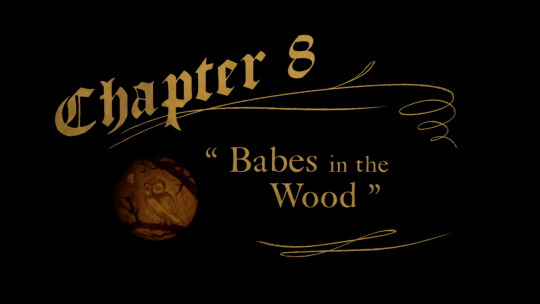
“Where’s Greg, Wirt?”
Babes in the Wood is delightful and goofy and lighthearted exactly once.
In the same way our fourth-to-last episode mirrored our fourth, this third-to-last episode mirrors our third: Chapters 4 and 7 focus on Wirt, but 3 and 8 are Greg’s. It’s not simply a matter of who the main character is, but what these episodes are about: Greg’s love of fun clashing with his drive to help others. Both times he's spurred by the desire to help others to go off on his own, both times he gets distracted by whimsical wonders involving funny animals and physical humor, and both times he ends up deciding to help out anyway. But despite switching his goal from making the whole world a better place to just helping his brother, the stakes are actually far higher now, so the fun has to be that much more fun if we want the full horror of the ending to sink in.
There’s no tonal shift in the series that’s more devastating than Greg falling prey to the Beast after nearly ten minutes of goofiness in Cloud City. It turns a moment of welcome relief from the growing tension of Wirt’s despair into a dagger in the heart, and the knife is twisted when we learn in our next episode what the Unknown truly is.

That despair is evident well before Wirt explicitly gives up. We get our second opening in a row featuring Beatrice in a hopeless search, and things aren’t much better for the boys. All sense of progression from the first episode feels lost, with Wirt reverting to mumbling poetry and Greg reverting to Rock Facts. Their boat is an outhouse and Greg uses a guitar as an oar, because (if you’ll pardon my French) they’re up shit creek without a paddle. When they land, Greg’s victorious bugle is a ridiculous sign of hope, but he soon drops it in the same way he abandons the guitar: in Schooltown Follies he takes instruments to help others, but this time he loses them.
Wirt’s frustration with Greg threatened to boil over in The Ringing of the Bell, only to be cooled when the Woodsman interrupts them. This time there’s no such interruption, so after Greg’s total failure to read the room gets to be too much, his brother finally snaps. It crucially isn’t entirely unjustified, as Greg’s antics might be funny to us but have not been appreciated by Wirt, and despite Greg’s age excusing his lack of emotional intelligence, it’s still gotta be frustrating for a teen to deal with that behavior nonstop. And Wirt’s “tirade” reflects his depression, because he doesn’t even seem that angry: he doesn’t shout or rave, he’s just openly irritated as he argues that they’ll be lost forever. This is apathy and fatigue, because he’s lost the energy to be furious.
But the most chilling part of the exchange isn’t Wirt cruelly blaming Greg for their mess, or abandoning their search. It’s when, after Wirt asks if they can give up, Greg responds with a chipper “You can do anything if you set your mind to it!”, a sentiment that the Beast will fiendishly repeat verbatim while tricking Greg. It’s such a generic positive expression that Greg hangs a lampshade on it, but it shows the darker side of the power our minds have over our well-being. Sure, it’s a great lesson that focus and dedication can help us achieve our dreams, but if we use that focus and dedication towards self-destructive behavior, there’s no limit to how badly we can hurt ourselves.
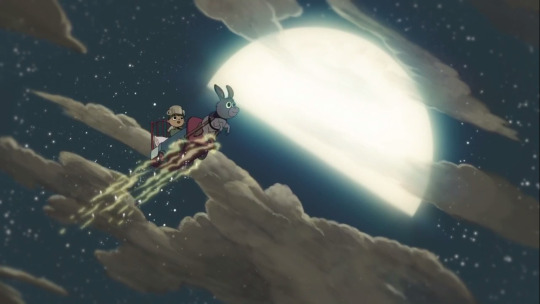
After a goofy sort of prayer (incorporating lines from the classic Trick or Treat poem, which will become super relevant an episode from now), Greg is whisked away by so-creepy-it’s-funny cherubim to the score of a so-overwrought-it’s-funny song. His flight aboard the bed/cart pulled by a donkey across the sky feels legitimately magical, but we soon switch to the surreal world of 1930′s songs and physics.
Cloud City is such a stark contrast to the tone of the episode so far that it instantly feels delightful, and such a stark contrast to the tone of the entire series that it lends a special sort of wonder to Greg’s dreamland. References to old cartoons are everywhere in Over the Garden Wall, and before we delve into the tension of our last two episodes, we get one last gigantic celebration of the past with a sequence straight from the golden age of animation.
The transition alone is enough to make this scene hilarious, but the actual jokes help quite a bit: Greg’s growing impatience with the numerous Wizard of Oz reception committees is my favorite gag of the night. Everything is cute to the point of being cloying, including our three angels that look and sound an awful lot like Greg, and the parade that he leads seems like such a fun and peaceful affair after so much time wandering alone. It’s easy to get as roped into it as Greg when we first watch it. But considering the events of our next episode, the scene destroys me every time I rewatch it, because there’s a very specific place Greg is being welcomed to.
Babes in the Wood gets a lot less cute when it becomes clear that it’s a welcoming committee for a dying child. Greg and Wirt are drowning, and this is the episode where the shock wears off and the cold sets in and the younger and weaker of the two looks into a bright light. Greg’s near-death experience is hammered in when we get to The Unknown, but for now it’s being rationalized in a way that brings him comfort.

The cold is Greg’s enemy, and the same childish tone is used to show that he’s willing to fight for his life: thus, the North Wind segment is ironically more hopeful to me than the parade’s warm welcome of death. This third song sounds enough like a Randy Newman number that I’m honestly still convinced it’s an uncredited Randy Newman performance, and it jolts us back to reality for a moment as we see the effect this bitter wind has on our babes in the woods. The boys are starting to freeze, and we again see Beatrice searching for them, getting so close before an owl that looks remarkably like the one we saw in our first episode scares her off. The episode doesn’t want to lose us completely to the sky, and this grounding helps keep the stakes clear as we complete Greg’s dream.
The Popeye-esque battle between Greg and Ol’ Windbag is a hoot, between the latter’s grumbling anger and the former rolling up his sleeve to get back into the brawl. Its conclusion is hidden from us, so we have no idea how Greg gets him in a bottle, but that fits right in with the weird logic of this throwback and allows us to meet the Queen of the Clouds.

I ought to bring up the theory that everything we see here is an illusion created by the Beast, even though I don’t really subscribe to it myself. The most obvious “hint” is that this sequence directly leads to Greg deciding to join the Beast with an off-screen promise, but we also have the old man in the welcoming march wearing an outfit just like Wirt’s and holding a lantern, perhaps a reference to the Beast’s intended fate for Greg’s brother. Plus there’s lines in the songs that seem like they’re luring Greg in, especially the assurance that the wonders of Cloud City “ain’t gonna lie,” which sounds a lot like what a liar would say. Both the Queen of the Clouds and the Beast pointedly call him Gregory instead of Greg, but so does Old Lady Mrs. Daniels (and Wirt when introducing him in Songs of the Dark Lantern).
While it’s a neat enough idea, I think the Queen of Clouds is pretty clearly on Greg’s side for real: she seems upset at his fate in a way that doesn’t make much sense for an ally of the Beast. I also think it’s more meaningful for Greg to truly have the choice between happiness and responsibility, between the possible peace of rest and the definite struggle of life, and for him to choose the latter right as his brother is giving in. But I’ve got no beef with folks whose interpretation of the show is enhanced by this theory, so believe what you want to believe about this ambiguous situation.
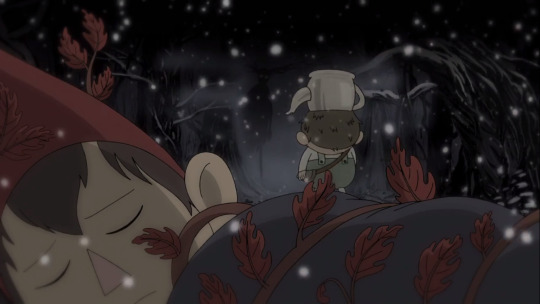
Either way, we cut back to Wirt instead of Greg when the dream ends, and he’s still annoyed as he’s trying to sleep. Greg’s strange new seriousness is already cause for concern, and asking Wirt to take care of the frog is even more alarming, but even that doesn’t compare the horror of realizing where he’s actually going. Or rather, with whom.
This is another reason why I think the Queen is an ally: while it’s obviously dangerous for Greg to go with the Beast, that’s what it takes for Wirt to snap out of his funk. It’s a hell of a gambit, but as soon as he starts to awaken, he’s immediately concerned for Greg’s safety despite whatever anger or resentment he had, sparing no time or thought to the branches creeping over him as he runs after his brother.
The quiet distortion as we follow his frantic search is soon met by the Beast’s song, but even as he blames himself for Greg’s plight, Wirt is no longer content to wallow in despair. Because it turns out that these brothers are more similar than they seem, and neither is truly capable of letting the other suffer. In the folk tale for which this episode is named, two children abandoned in the woods eventually die and are covered in leaves by small birds (with some versions seeing them enter heaven), but as we’ll see in our next episode, this isn’t a folk tale.
The thrumming noise intensifies as Wirt slips on the ice, then we add visual distortion as he plummets into the freezing water. He’s saved, but this isn’t water that sees him reborn: the distortion finally breaks as Beatrice asks the episode’s terrible question, and we’re left in the cold.
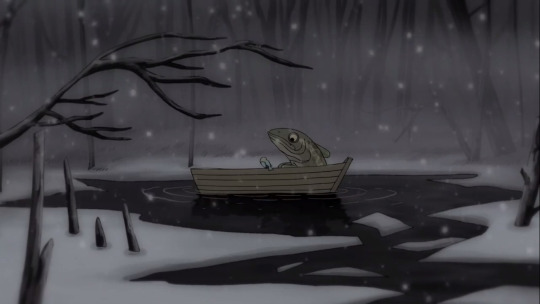
Every even-numbered episode of Over the Garden Wall, perhaps by virtue of airing twice per night, ends in a mood-setting cliffhanger that grows tenser and tenser with every iteration (or at least it does until the end). First we got a leaf symbolically caught in a fence, then the Beast’s introduction, then the fallout of Adelaide, and now the capture of Greg. Getting trapped has always been a threat for these roving heroes, but the greatest threat of all, that of Wirt trapping himself, has been handled. Things look bleaker than they ever have, but despite the glee of Greg’s dream contrasting with the harshness of reality, Wirt’s ability to climb out of the pit of despair keeps hope alive: even in absence, Greg’s influence looms large.
Rock Factsheet
Dinosaurs had big ears, but everyone forgot because dinosaur ears don’t have bones.
Where have we come, and where shall we end?
Most of these were mentioned in the main analysis, but it’s great that we hear Wirt’s description of Into the Unknown right before the episode itself shows us what happened.
#babes in the wood#over the garden wall#otgw#steven universally#winsor mccay#little nemo in slumberland
116 notes
·
View notes
Text
Chapter 7: The Ringing of the Bell
The history of animation that I’ve written about in these introductions can be more accurately described as the history of American animation. Which, sure, is humongous and revolutionary, but sticking to the States leaves out the first full-length animated film (1917′s El Apóstol, courtesy of Argentina) and the oldest surviving animated film (1926′s The Adventures of Prince Achmed, courtesy of Germany), as well as all the European predecessors to modern cartoons like the phenakistiscope or the zoetrope. But even that expansion limits us to the West, and although night has fallen on Over the Garden Wall, it’s time to look to the rising sun.
World War I shaped every aspect of global politics in the 20th century, and Japan was no exception. The Imperial Navy, already battle-tested in the Russo-Japanese War, developed into an unmatched force in the East whose influence lingered well after the Great War’s conclusion in 1918. A small part of that legacy was shaped by a boy born during the war, around the same time Max Fleischer developed his rotoscope. This boy, Katsuji, was fascinated with flight from a young age, and in another era, this might have led to a wonderful career in nonviolent aviation. Instead, the company Katsuji created in adulthood manufactured parts for the Zero warplane, which infamously attacked Pearl Harbor and launched the United States into World War II.
But this isn’t the story of how war turned a beautiful dream of flight into something twisted. It’s about how peace allowed a beautiful dream of flight to flourish into one of the greatest legacies in the history of animation. Because while 1941 might have ended with Katsuji Miyazaki’s creation leaving devastation in its wake, the year began with the birth of his second son.
Hayao Miyazaki was an artist from a young age, excelling early with detailed depictions of fantastical air machines but needing practice when it came to drawing people (spoiler alert, the practice paid off). He worked for cartoon giant Toei Animation out of college, where he met his lifelong partner in animation, Isao Takahata, and his lifelong partner in marriage, Akemi Ōta. He left Toei in 1971, but continued working with Takahata for a variety of studios, one of which allowed him to direct his first movie: The Castle of Cagliostro, a Lupin III movie that to this day proves that Miyazaki never needed the original characters or outstanding animation quality with which he’d become synonymous to produce an outstanding film. You don’t need to know a single thing about Lupin III to appreciate The Castle of Cagliostro, which I know because I didn’t know a single thing about Lupin III when I had my mind blown by The Castle of Cagliostro.
Still, Miyazaki had ideas of his own, one of which he developed into a monthly manga about a warrior princess with heavy environmentalist themes. In 1984, he worked with Takahata (alongside a composer Takahata found named Mamoru Fujisawa, better known by his stage name Joe Hisaishi) to adapt this comic, Nausicaä of the Valley of the Wind, into a feature film. Something was clearly clicking, because the animators launched their own company with Hisaishi as an iconic collaborator: Studio Ghibli, named after a term for a hot desert wind that happened to also be the name of a WWII-era warplane.
The wind rose, and Studio Ghibli’s output soon became the stuff of legend: Miyazaki in particular has yet to make a film that isn’t spectacular. My personal favorite is Castle in the Sky, followed closely by that other movie about a warrior princess with heavy environmental themes, Princess Mononoke. But when it comes to influences on Over the Garden Wall, and particularly The Ringing of the Bell, it’s hard to see the story of characters lost in a strange world full of deception, with big-headed witches and hyper-specific rules for dealing with evil spirits, without thinking about the first Miyazaki movie I ever saw, back when I was young enough to be a little annoyed that I had to read subtitles: 2001′s instant classic, the startlingly magnificent Spirited Away.

“I’m glad you have a plan.”
As befits a Miyazaki Episode, breathtaking opening shots of nature ease us into The Ringing of the Bell, aided by a quiet piano to set a mood that’s somber, but not miserable. It might be a little generic for rain to accompany sadness, but despite our circumstances this isn’t Sad Rain: it’s a sign that life goes on, and the wandering continues through impediments great and small.
Wirt and Greg are back on the road, but now their roles from Schooltown Follies are reversed: this time Greg’s asking Wirt about his plan, and Wirt’s the one revealing he doesn’t have one. Sure, he doesn’t reveal it to Greg until the end of the episode, but it’s clear to us that he doesn’t know what to do. His irritation with Greg starts to swell up, but recedes for the moment as the Woodsman finally returns to straight-up tell us how the series is going to end.
The power of hope becomes the central topic of Over the Garden Wall in its second half, and despite his raving delivery, the Woodsman concretely warns the boys that losing hope is how the Beast can claim them. Unfortunately he’s still a terrible communicator, and the lingering idea that he might be the Beast is still in our heroes’ heads, so Wirt kicks himself loose and they escape, setting off the cleverest trick in The Ringing of the Bell: after gradually growing over the course of the series, Wirt is finally competent.

Everything goes as about as well as it can in this episode. Wirt’s idea to stay in the cabin leads to him lifting a curse from a new friend. His plan to escape Auntie Whispers by helping out with chores is solid, given the information available, and while Greg and Jason Funderburker are instrumental to the greater victory over the spirit—Jason by gulping down the hypnotic bell and Greg by figuring out how to use it—Wirt’s the only one smart enough to apply this strategy to its fullest. It’s a shame Greg’s never gonna see that magical tiger, but Lorna is freed thanks to Wirt’s superior command, and the fact that it’s a command is especially relevant because the bulk of Wirt’s heroic actions to this point have been commands he’s followed rather than given. As Greg says, Wirt saves the day twice. And if we count the day before, when his bassooning kept them on the ferry and he cut himself and Greg loose from Adelaide’s thread, that’s four heroic acts in the last 48 hours.
Moreover, this is the second consecutive episode where Wirt sings a duet, providing another glimpse of hope in his life as he does chores with Lorna. Considering we precede The Ringing of the Bell with two episodes where his feelings for Sara are brought up, I appreciate the realism of this new crush: it seems mutual, but both of these kids are awkward and nothing comes of it. It isn’t treated like a huge deal, because crushes flit up and diminish all the time in your teens, and we just move on after a pleasant but fleeting connection is made. By all accounts, Wirt has a pretty good day here.
But that’s the thing about depression, whether clinical or situational: it diminishes your sense of accomplishment and amplifies the bad. It’s brilliant that this episode makes Wirt the hero, because if even this can’t stop him from losing hope, perhaps nothing will. Hitting him with obstacle after obstacle might wear him down, but the bigger story only works if he’s his own obstacle. Auntie Whispers inadvertently taints his victory by warning him about Adelaide an episode too late, bringing him right back to Beatrice’s lies. He connects with Lorna, but their meeting is brief, leaving him on the road once more. In a healthier headspace he’d be able to find strength in his positive developments, but instead we set the stage for Babes in the Wood, where he truly gives up.
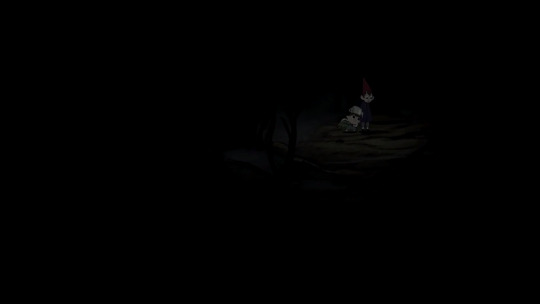
Speaking of Babes in the Wood, Greg solidifies himself here as a force for hope, believing with gusto that Wirt has a plan and encouraging him even after learning that he doesn’t. Greg has already forgiven Beatrice to the point where he takes as a given that they should wait for her, and when Wirt totally ignores his aside about how they shouldn’t enter the old cabin, he’s still game to follow along. And as mentioned, he’s key to the victory Wirt accomplishes: this is the third episode in a row where Greg has an idea to help folks out that Wirt ends up achieving, and their partnership only makes Wirt’s increasing annoyance harder to watch.
As is standard, Greg is also hilarious, particularly when it comes to his reaction to the eerie black turtles that caused their very first conflict with Beatrice’s dog (although “You can run and you can hide!” is perhaps his most delightful line). He pulls off the episode’s most difficult maneuver by finding humor in the act of plainly explaining a joke; Lorna being bad and Auntie Whispers being good is funny in the same way seeing the black turtles is funny, but in both cases, Greg goes for the more traditional meaning of “funny” and it works.
There’s plenty of humor in this episode to go around, though. Wirt gets some laughs of his own, and as humorous as Greg is, the delivery of the night belongs to Elijah Wood’s flabbergasted reaction to Lorna casually noting that Auntie Whispers isn’t a blood relative. But despite the comedy and the melancholy that follows, more than anything else this is a horror episode.
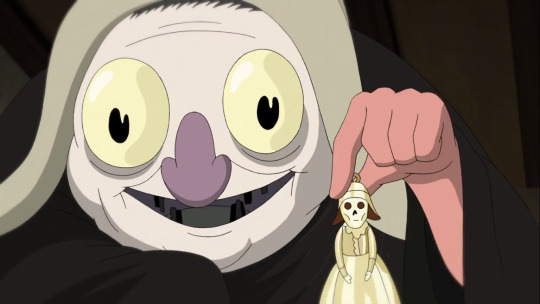
There are perhaps scarier elements of the series than Auntie Whispers even in this episode: Lorna’s horrific cursed form is certainly frightening. But I’d bet real money that if this had come out when I was a kid, Auntie Whispers would fuel the majority of my Over the Garden Wall-related nightmares. Visually, her inhuman proportions, jagged black teeth, and distorted pie-eyed pupils are bad enough; Patrick McHale based her appearance off an owl-like old man in a 19th century illustration, but there’s a distinct Yubaba/Zeniba feel to her in the same way Lorna’s evil spirit reminds me of No Face at his hungriest. Still, it’s Tim Curry, following John Cleese’s role as an established British ham voicing an old magical woman, that makes Auntie Whispers truly frightening. (Although, yeah, the name also helps, what an excellent campfire story witch name.)
Cleese goes full Cleese for Endicott and Adelaide, but Curry’s performance is chillingly subdued, and that tone is critical to the horror: an over-the-top delivery has its time in place, but it’s so much scarier to hear her matter-of-factly establish that unwelcome guests will be devoured alive. This attitude stems from having genuinely good intentions and speaking to Lorna’s actions instead of her own, but her calm is just plain terrifying when we think of her as the devourer (an image that isn’t helped when she devours a turtle alive). The accompanying piano only enhances her uncannily serene approach to sorting the bones of past victims and forcing Lorna to clean the house. It’s honestly effective enough that it still makes me uncomfortable on rewatch, when her true motives are known.

And of course, the Beast returns, solidifying our fourth-to-last episode as a mirror to our fourth, Songs of the Dark Lantern (both feature the Woodsman conversing with the Beast, both feature Wirt singing a song and saving a friend, both feature Beatrice getting left out, and both occur during rainfall). This time we see the Beast during the day, despite him being a creature lurking in shadow: not even the sun can protect us from his influence, which fits perfectly with Wirt’s bright accomplishments not helping his growing despair.
The Beast remains a menacing figure, but we again see him as a manipulator instead of a one-dimensional looming threat. He reminds us for the second time that the Woodsman’s daughter’s life is on the line, but this time does so with a cruel hypothetical question that falsely associates a lack of willingness to help capture two innocent kids with a lack of care for another child’s soul. The Woodsman, to his credit, doesn’t seem to buy it, but still sees no other alternative as the Beast tells another lie: that the only possible path is surrender.
It’s strange to think that we’re already wrapping up after just seven episodes of this miniseries. But as we build to the final confrontation with the Beast, we get a couple of lasts: this is is the last episode featuring a traditional encounter-of-the-day where the boys meet new characters together, and the last episode that ends with Wirt and Greg wandering the woods together. Because if we’re really aiming for despair, we have to go for the things we take as a given: namely, that these brothers are going to stick together.
Where have we come, and where shall we end?
In this, the definitive “these are modern kids” report: Wirt outright tells us that he’s, like, in high school.
58 notes
·
View notes
Text
Chapter 6: Lullaby in Frogland
Let’s look back. Way back. Back before the dawn of animation, before the dawn of film, well before Ruby or Spears or Disney or Iwerks or either Fleischer Brother. Back to 1835, in a town named Florida in a state named Missouri when a boy named Samuel was born.
Like Ub Iwerks, Sam was raised in Missouri. And like Max Fleischer, Sam’s family took a financial hit when his father’s work stopped (this time due to a premature death rather than the decline of tailory), giving Sam a practical approach to employment. He left school at age eleven to become a printer’s apprentice, then moved to his older brother’s newspaper as a typesetter and occasional columnist, writing humorous articles and drawing cartoons. But unlike Beatrix Potter or the animators we’ve covered, visual art wasn’t in the cards for Sam.
He moved to the East Coast to work for other papers, bouncing between cities before returning to the midwest to embark on a career he’d dreamed of since he was old enough to dream: piloting a steamboat. He thrived on the water, and kept writing about his work along the river, but everything stopped when the Civil War closed off the Mississippi. So Sam headed west to work for the same brother who once ran the newspaper, now a politician in Nevada (I’d be remiss if I didn’t point out that this brother was for some reason named Orion). Sam tried mining, and it didn’t take, but he’d gotten pretty good at writing and set off for San Francisco to get back into his jocular brand of journalism.
It was here that he had his first success, a short story published in his paper called Jim Smiley and His Jumping Frog. But, like a certain frog we’ve covered in this series, Sam wasn’t huge on permanent names. Within a month, the story was reprinted as The Celebrated Jumping Frog of Calaveras County, and Jim Smiley’s name was changed to Jim Greeley. Until the book version came out, when it was changed back to Jim Smiley. And this whole time, within the story, it’s a mystery whether Jim’s real name is actually Leonidas (it turns out that it isn’t, but it might be). None of this should come as a surprise for Samuel Clemens, who wrote under the names of Josh, Thomas Jefferson Snodgrass, and most famously, Mark Twain.
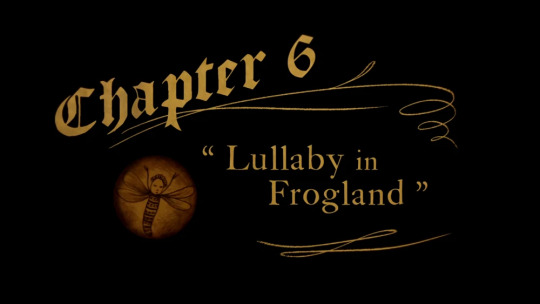
“I knew you were special.”
Over the Garden Wall is, among other things, a story about the importance of solid communication. After five episodes spent building up our heroes as a group of friends, all it takes is one episode of terrible communication to throw it all away. The specific issues vary, despite leading to a similar result of not verbalizing their thoughts very well: Greg’s youth stops him from articulating his rapidly changing ideas, Wirt’s anxiety leaves him too timid to speak up or too rambling to be clear, Beatrice’s true intentions make her obfuscate the truth, and Jason Funderburker straight-up can’t talk. Or so we think.
This time he’s named for American statesmen George Washington and Benjamin Franklin, which fits the continuing vintage Americana vibe of the series—while I figure it’s a coincidence, it should be noted that Mark Twain’s Jumping Frog was named after American statesman Daniel Webster. Surrounded by other frogs that walk around and wear fancy garb, our frog is more anthropomorphic than ever, standing on his hind legs and dancing along with Greg. But it’s still a shock to hear him open his mouth and sing, a shock that soon cedes to the realization that the frog playing the piano at the beginning of the series is singing the Jack Jones song in the montage that follows.
Lullaby in Frogland is Jason Funderburker’s episode through and through, so much so that it’s the first time we hear of his namesake, Jason Funderberker. This is an episode where Wirt rejects Greg’s assertion that their frog is “our frog,” a plot point that’s paid off in their last conversation in the series. This is an episode where Greg wonders aloud if he can be a hero, sees the frog set off on a diverging path immediately afterwards, and accepts it, because he’s willing to sacrifice his happiness for the good of others. And it’s an episode where the frog returns after a harrowing betrayal, showing that even when all seems lost, there’s still room for hope. Over the Garden Wall (the song) might not sound like a traditional lullaby, but it soothes us into a cold night as the sun sets on the first half of Over the Garden Wall (the show).
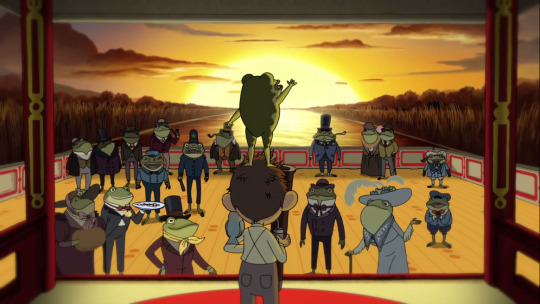
Adelaide’s true nature is foreshadowed by Beatrice’s sudden hesitance to bring the brothers to the pasture after several episodes of nagging, but the twist is made tragic by Wirt finally letting his guard down enough to be happy. He sings a completed Adelaide Parade with Greg and joins the dance before collapsing into the most earnest laughter I’ve ever heard in a cartoon. He’s a good enough friend to notice when Beatrice is “uncharacteristically wistful,” and takes a risk by playing the bassoon instead of just giving up. He’s still got growing to do—it’s one thing to blame Greg for getting them in trouble by throwing away the ferry fare and forcing them to sneak aboard, but another thing to literally shout “Take him, not me!” when confronted by the frog fuzz—so it’s clear that his journey isn’t over yet, but he doesn’t even get a full episode of peace before everything blows up.
The whole steamboat sequence flows between simple delights, like saluting the captain mid-chase, the revelation that the frogs love music more than they hate trespassers, and the repeated gags of three gentlemen frogs snatching up flying flies and a frog mother dropping her tadpoles. Everything just feels calm, even when antics are afoot. Wirt gets to save the day with his bassooning, Greg gets to feel rewarded in his knowledge that his frog is special, Jason gets to sing a song after being silent throughout the series, and Beatrice seems, for now, to come to a sort of peace about things after several clear attempts to sidetrack the boys. This is the only episode to feature two major stories instead of one, but the steamer segment is rich enough to feel like a full episode. If only we could’ve stopped here.

All roads lead to Twain when it comes to depictions of steamboats as a go-to American icon, which is why he preceded this discussion of Lullaby in Frogland: I’m not claiming Mickey Mouse wouldn’t have been successful if his first cartoon was about something else, but I’m certainly claiming that we wouldn’t have gotten Steamboat Willie as it was if Ub Iwerks hadn’t grown up in a Missouri whose lore was shaped by Twain’s tales of the river. But while the author is the root of the episode’s many influences, I think the most fascinating branch that we borrow from is The Princess and the Frog.
2009 was a great year for animation, seeing the release of Coraline, Fantastic Mr. Fox, The Secret of Kells, the surprisingly great Cloudy With a Chance of Meatballs, and the first ten minutes of Up (also the rest of Up, if I’m feeling generous). The first two on that list are my favorite of the year, twin stop-motion masterpieces that I’m always in the mood to watch, but The Princess and the Frog is a brilliant last gasp from Disney’s 2D animation studio. It isn’t the final traditionally animated film they made (that would be 2011′s Winnie the Pooh), nor the final fully sincere princess movie they made (that would be 2010′s Tangled), but it marks the beginning of the end for both trends: for better and worse, modern Disney animation feels the need to loudly subvert old tropes and wouldn’t be caught dead in two dimensions.
Lullaby in Frogland’s connection to The Princess and the Frog is certainly visible on the surface level: both feature a long sequence starring frogs on a steamboat where a lead character must pretend to be another animal and play a woodwind instrument to get out of a jam, and both involve our heroes seeking help from a wise woman far from civilization (even if only one of these women is actually helpful). But it’s the somber nostalgia factor that binds these stories closer than anything, the knowledge that this is the end of the road for this type of tale. The ferry’s gotta land somewhere, and the cold is setting in as the frogs begin hibernating for the winter, but there’s still more story to tell.
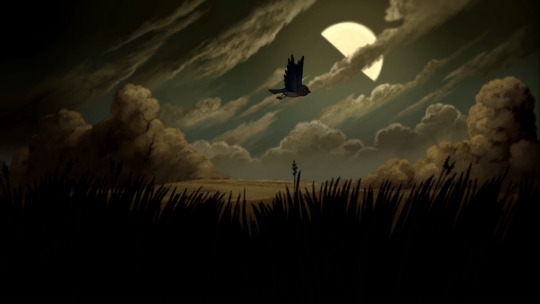
The second story of Lullaby in Frogland is scored throughout by a haunting string and piano rendition of Adelaide Parade, and Adelaide herself is immediately captivating. John Cleese returns for the second episode in a row, but as both of these episodes aired the same night, it feels like a consistent through-line: in the first half, he’s an eccentric who might be a deranged maniac but is actually harmless, and now he’s a witch who might be harmless but is actually a deranged maniac.
Adelaide gets a compelling amount of detail for someone who’s barely in the show. We don’t get any explanation about her fatal weakness to...fresh air? Coldness in general? Either way, like the Wicked Witch of the West’s lethal reaction to water, it’s absurd that someone like her has managed to live this long. She never says what she needs a child servant for, why she has scissors that seem custom-made for Beatrice’s specific curse, or what her spider-like deal with yarn and wool is (she has a black widow hourglass on her back, but also reminds me of the Greek Fates with her emphasis on thread). We never find out how she’s connected to the Beast, whose theme bleeds into her music as she proclaims, without much prompting, that she follows his commands; her goal of using children as zombie slaves seems counter to his goal of turning them into trees to fuel his soul lantern. But this blend of unexplained characteristics and seemingly inconsistent motives only makes her more enthralling to me, because she feels like the major villain of another story who just happens to intersect with ours.
What makes Adelaide even more compelling on rewatch is that her scissors, despite their gruesome method for curing the curse, do end up working. Which means she did mean to help Beatrice out as part of the deal. At no point does Adelaide lie, and given Beatrice knows she’s bad news as she lures the brothers in, it becomes clear that for all her villainy, Adelaide is an honest witch. I’m always down for baddies that tell the truth, but it’s of particular interest when we compare her to the Beast, whose whole deal is lying.
The only liar in this episode is Beatrice, even if she wanted to set things straight without hurting anyone; she values her friendship with the boys so much now that she’d rather make herself a servant to Adelaide than just tell them she’s dangerous and reveal that she lied. By the time she’s willing to tell the truth, it’s too late, and not even saving Greg and Wirt by killing Adelaide is enough for Wirt to forgive her. Considering he knows in The Unknown that the scissors he uses to escape the yarn can save her family, he was also listening in on the end of the conversation before entering the house, which means he must have heard that she was willing to sacrifice herself, but that doesn’t matter either. Beatrice gave the boys hope, and no matter how badly she tried to stop it, the encounter with Adelaide transforms Wirt. Where he was once nervous and unsure, and was then briefly optimistic, he’s now sullen and untrusting.
But again, in comes Jason Funderburker, croaking and hopping on all fours once more to bring some light to the darkening series. He doesn’t do much for Wirt, but allows Greg to quickly get over whatever trauma he had about getting webbed up in yarn; he’s remarkably quiet about it, but it’s important to remember that he was betrayed, too. Whether he doesn’t understand exactly what happened or is just quicker to forgive, Greg is fine with Beatrice, allowing us to focus harder on Wirt’s reaction from now on.
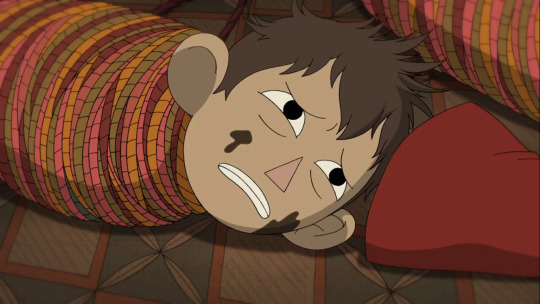
It’s all rain and winter for Wirt until the end of his adventure. But the show isn’t content to leave him even slightly forlorn: when it gets too dark, he has a frog to swallow a lantern to light the way, and when it gets too cold, he has a brother to cover him in leaves, and when he falls, he has Beatrice to help pull him back up. Even the Woodsman tries to save him in his own way (talk about folks who are bad at communication). Bad things happen, and people make mistakes, but the bigger mistake is allowing that to close you off to others, or to never forgive friends that are genuinely sorry. Our heroes have taken the ferry to the other side, and now the story can shift to one about the folly of abandoning all hope.
Where have we come, and where shall we end?
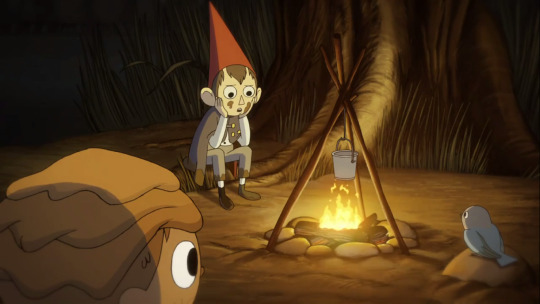
On top of Jason Funderberker, who’s set up as a major rival to make his eventual reveal one of the show’s best jokes, Wirt gives Beatrice a general summary of Into the Unknown three episodes before we see it play out.
#lullaby in frogland#over the garden wall#otgw#steven universally#mark twain#the princess and the frog
64 notes
·
View notes
Text
Chapter 5: Mad Love
So far, when going over brief histories of animators that have inspired Over the Garden Wall, I’ve written about pioneers like Ub Iwerks and the Fleischer Brothers (and maybe Walt Disney a little). Folks who were born well before cartoons on film were invented, and in some cases, before film itself was invented. By that metric, a story about two animators born in 1933 and 1938, both of whom were still alive when this post was first written, might not sound as impressive. But you don’t have to do something first to make a mark, and Joseph Clemons Ruby and Charles Kenneth Spears, two men from the first generation to grow up in the age of animation, mastered the art of converting the old into the new.
Ruby-Spears was founded in 1977, but came into its own in the 80s by producing the Alvin and the Chipmunk cartoon. Shows like this, based on preexisting material, were the studio’s bread and butter. Ever wanted to see a cartoon version of Mork and Mindy or Laverne and Shirley? A Mr. T cartoon? A Punky Brewster cartoon? A Police Academy cartoon? A Rambo cartoon? A cartoon called Chuck Norris: Karate Kommandos? Ruby-Spears had your back. Ruby-Spears brought video games like Q*bert and Frogger to television, and their penultimate production before shutting down in the 90s was the Mega Man cartoon. These shows varied in quality, to be sure, but just because something is derivative doesn’t mean it lacks value, as proven by the project that skyrocketed the careers of Joe Ruby and Ken Spears: while working for another duo, William Hanna and Joseph Barbera, Ruby and Spears took a dime-a-dozen ripoff assignment and instead created one of the most iconic cartoons of all time.
Ruby and Spears began in Hanna-Barbera’s sound department, but soon became writers on Space Ghost (most famous now for its Adult Swim parody decades later, a show derived from an old cartoon that was itself derived into shows like Sealab 2021 and Harvey Birdman). While waiting on a meeting with Barbera, an agent mentioned that the head of CBS’s daytime programming was interested in developing a teen rock band cartoon to capitalize on the success of teen rock band cartoon The Archie Show, with the twist that these kids solved mysteries. Ruby and Spears leapt at the opportunity, working with the studio’s veteran character designer Iwao Takamoto to create five teens who solved teen crimes to appeal to a teen audience: Geoff, Mike, Kelly, Linda, and W.W. (in all my research, I never found out what those initials stood for). Because the Archies had a huge gluttonous sheepdog named Hot Dog to be friends with the rail-thin gluttonous Jughead, the band starring in the newly-christened Mysteries Five had a huge gluttonous sheepdog named Too Much to be friends with the rail-thin gluttonous W.W.—but don’t worry, Too Much stood out by playing the bongos.
Ruby and Spears could’ve left it at that, cashing a quick buck off the success of The Archie Show, especially because they frankly did just that later in their careers at Hanna-Barbera with shows like Jabberjaw. But for now, despite the Archie-ripping first draft, they wanted something more, and soon expanded the gimmick beyond just solving mysteries: these teens would solve spooky mysteries. Mysteries Five became Who’s S-S-Scared?, and to keep the horror from being too much for the kids, Too Much shifted from a sheepdog back to Takamoto’s first idea, a dopey Great Dane, one that was comically frightened of everything to subvert the image of a brave watchdog. Eventually the entire band concept was dropped, except for the part where the teens drove a tour van to visit new locations, and the redundant second male lead, Mike, died in the crossfire. The final step was changing the names of the heroes, because none of them were really working with this new version of the cartoon: Geoff became Fred, Kelly became Daphne, Linda became Velma, W.W. became Shaggy, and Too Much got a name inspired by Frank Sinatra’s scatting from Strangers in the Night: Skippety-Boo-Baw-Baw.
(I made one of those names up. Can you meddling kids crack the case?)
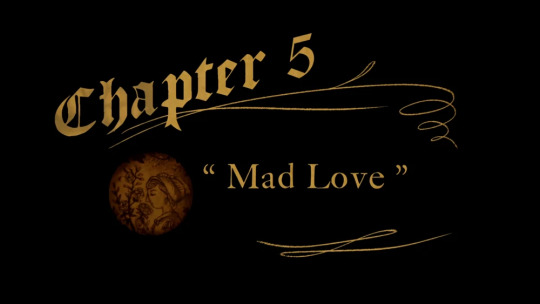
“Start searching for change.”
The middle two episodes of Over the Garden Wall begin in the middle of scenes, with our heroes already in the locations they’ll spend most of the story in. The trail we’ve followed for the past four episodes takes a backseat to areas where we can nestle in and talk, developing our characters’ relationships to their fullest so they can fall apart before Episode 7 continues the journey.
Mad Love in particular thrusts us right into a rambling conversation dominated by an instantly recognizable John Cleese as Quincy Endicott, a wealth British vision of what Greg would be if he got older but never grew up. He disregards the food on his plate and the concept of successive sentences following a coherent thread, then interrupts himself to dance on the table, and Greg is in. Beatrice and Wirt have a more serious aside about the ethics of ripping off the tea magnate, with Beatrice favoring crimes and Wirt favoring honesty. Fred the Horse gives us the earliest-ever best line of the episode, answering Wirt’s assertion that he has free will with a pitch-perfect “I wanna steal.” There are five main characters we’ll follow in Mad Love, and within a minute they’re succinctly established so we can spend the rest of our episode exploring. Wandering at a relaxed pace is all well and good, but we got some work to do now.
This isn’t my first time writing about a Scooby-Doo episode of a cartoon that I love, but even more than Gem Hunt, this is a hell of a Scooby-Doo episode. We’ve got five leads (check), and just happened to add a new character whose name is Fred (check) and is a large cowardly talking quadruped (check), and they’re hunting a ghost (check) who’s actually a living person (check) over a property dispute (check), and in doing so they split up (check) and find a secret passage (check). Zoinks! Over the Garden Wall is a celebration of animation, and while we might not think of Scooby-Doo when we think of gorgeous animation (or, let’s be real, quality content), it’s a cartoon franchise that’s been influential on kids for fifty years despite its cheap production value and repetitive formula. It’s such a mainstay that it’s sometimes hard to remember how weird Scooby-Doo is (to the point where its greatest iteration by far, the amazing Mystery Incorporated, mines comedy gold by stepping back to explore what a society that allows these dumb plots to perpetually occur would actually look like). It’s animated Americana kitsch focused on mystery and horror written for kids, which makes it a top tier candidate for a full-episode reference in a show like Over the Garden Wall.
The biggest twist on the formula that Mad Love provides is that one of our mystery solvers is being robbed by some of the others, and the gang splits up not to look for more clues, but to distract Endicott from their looting. This may provide plenty of fuel for comedy, but assigning a separate mission to Wirt and Beatrice allows them to finally start to work past their differences while Greg, Endicott, and Fred take charge of the episode’s plot.
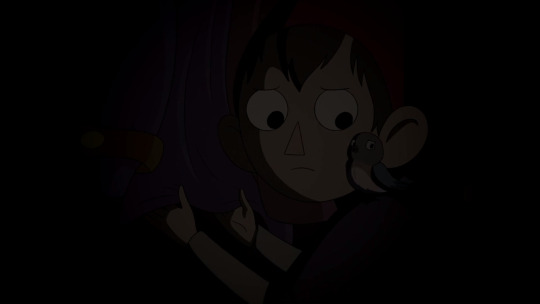
After four episodes of sniping whenever they converse, Beatrice and Wirt begin Mad Love at the same place we’ve always been. But even though it’s never mentioned, we’re now at a spot where Wirt has performed an uncharacteristically heroic act to rescue Beatrice, which may have cooled things down enough for her to open up the way she does here. It’s great that the shift is still gradual, and she’s still at a place where her version of a horror episode is spending quality time with him, but we need them to grow closer to make the encounter with Adelaide hit us where it hurts.
This is the episode where we learn Beatrice was once a human, a fact mentioned so off-handedly that Wirt hangs a lampshade on it. She’s ornery about it, which is par for the course, but after he pesters her to give more details and she tells her story in an outburst, Wirt reveals a new side of himself: as her theme plays on a lonely piano, he transforms into a good friend. Wirt has been varying degrees of selfish and hapless in every episode so far, but now that he knows the truth about Beatrice he’s able to put aside his bad attitude to earnestly sympathize with her. It’s not treated like anything special, but their entire relationship pivots around this conversation: we can’t have his jocularity in the upcoming boat ride or the bitterness that follows her betrayal without the genuine bond they create right here.
Beatrice softens as well, but not quite as much, lightly razzing him for thinking his crush on a girl is a secret as dark as her cursing her family. But speaking as a former teen, crushes that you don’t know how to act on suck, and it’s gotta be even worse for a kid as neurotic as Wirt. As we’ll later see, there’s every indication that this crush is mutual from an outside perspective, but Wirt is his own worst enemy, so dramatic and stuck in his head that of course he sees his feelings as a deep and powerful secret. I love that he scrambles for more secrets when Beatrice isn’t satisfied, adding that he plays clarinet and recites poetry by himself, not just because it’s funny but because it shows that he feels the need to tell her something as huge as the thing she told him. And then he goes on a spiel about architectural sensibilities, allowing for more razzing because Wirt’s still a weird guy and Beatrice still likes teasing him, but there’s a delightful new warmth to their back-and-forth. Greg might earn the necessary coins at the end of the episode, but it’s Beatrice and Wirt that find change.

Sweetness aside, Elijah Wood and Melanie Lynskey also have a shared talent for incredulity, and both get to show it off here: Lynskey as Wirt talks about French Rococo, and Wood as Beatrice and Fred plan their heist. This is still a humorous episode, which brings us to Greg’s ghost hunt (which, again, includes John friggin’ Cleese): Greg fits his usual role as comic relief, but takes the lead of a full plotline instead of sticking to the sidelines.
Greg’s fierce determination was first made prominent in Schooltown Follies, and now it’s back in full force as he pushes Endicott and Fred past their doubt and fears based not on facts, or even faith, but the sheer desire to see a ghost. He’s the only member of the team who’s sincerely sweet to Endicott, so free of ulterior motives that he throws away the reward the others had been seeking, but he can still be an insensitive kid who bulldozes past the concerns of others to get what he wants. There’s far more good than bad here, but I love that this show can portray Greg as a great kid without painting his innocence as a universal positive.
In a clever trick, Endicott’s inability to focus transforms from eccentricity to a potential sign of insanity, a feat that Cleese naturally nails. Fun fact: Monty Python’s Flying Circus was first recorded on September 7, 1969 (just a week before the series premiere of Scooby-Doo, Where Are You! aired on September 13) and this post that you’re reading was published on September 29, 2019. Which means that John Cleese has been practicing “man with a serious British voice doing silly things” for over fifty years, and he’s gotten pretty good at it! The dark history that’s suggested to be behind Endicott’s fortune is played for laughs, and just like Scooby-Doo, the possible horror our heroes are facing ends up not being as serious as we thought, because he hasn’t gone mad at all. The ghost is just a business rival voiced by Bebe Neuwirth doing a French accent, because casting directors Linda Lamontagne and Kristi Reed can apparently get whomever they want to do whatever they want.
But still, if I could bring a single one-off character along for the greater journey of the series, it would be Fred. True, he’s actually a two-off character, but Mad Love is where we get the lion’s share of his personality, and he’s an absolute hoot. Comedian Fred Stoller does the horse with his name more as a character in a stand-up bit than a character in an ongoing story, but the bit is so entertaining that I honestly doubt it would get old if he had a few more episodes with us. Fred simultaneously plays the part of amateur detective and amateur criminal, two roles which require a certain degree of subtlety, but he’s about as subtle as an actual horse galloping around a mansion would be, loudly “whispering” that he’s off to find more things to steal and shouting his suspicions that Endicott has lost his mind. I’m glad he’s an honest horse these days, but I’d have loved to see more of him.
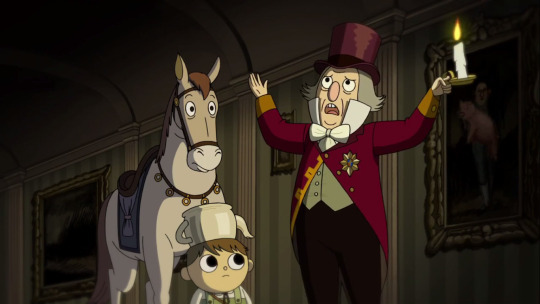
So yeah, a story about Wirt and Beatrice becoming friends and a story about Greg and two new friends solving a mystery (a mystery that Wirt actually solves, but hey, Greg helps!). It’s a pretty fun one throughout. Which makes the sudden turn at the end, when Greg discards the pennies that he won for his trouble, stand in stark contrast against the mood of the preceding episode. Heck, it stands in stark contrast against Greg’s mood from the entire series: this is the only time we ever see him look sullen, even though it’s played as another bit (“I’ve got no sense”). Our favorite frog reveals himself with a croak after quietly hiding under Greg’s kettle for literally the entire episode, and we end by seeing that no matter how good things have gone until this point, there’s clearly something in the water.
Where have we come, and where shall we end?

The glowing bell in Jason Funderburker’s belly at the end of the series indicates that these events actually happen, but the grave we pass in the penultimate episode complicates matters. However, if the Unknown really is a variant of the afterlife, maybe Endicott was the ghost all along!
42 notes
·
View notes
Text
Chapter 4: Songs of the Dark Lantern
In 1883, a boy named Majer was born in Krakow. The son of a successful tailor, Majer’s family moved to New York City when he was just shy of four. As was common for new immigrants, particularly Jewish immigrants looking to avoid the oppression of the Old Country (antisemitism sadly survived the journey the New World), his family took new names. His father Aaron became William, his mother Malka became Amelia, and Majer became Maximilian. Like just about anyone named Maximilian, he went by Max.
Max lived well off his father’s business in his childhood, but the Industrial Revolution was not kind to traditional clothing professions. By his teens, Max’s family was scraping by in Brooklyn, and the double whammy of poverty and the expectations placed upon any first-generation child created a work ethic that would last the rest of his life. While his natural gift for drawing led him to study at both commercial and traditional art school, the pragmatic side of him enrolled in a tradesman school as well.
Max got hired at a local newspaper, where he worked through a variety of jobs (including several in the photography department, another of his many interests) before settling in as a cartoonist. While he wouldn’t stay long, moving onto better-paying commercial work, his time in comics led him to befriend fellow cartoonist John Randolph Bray, who caught the animation bug in the 1910s and soon infected Max.
In the nineteenteens, large studios couldn’t compete with the much slower but far smoother techniques of a lone animator when it came to quality. But Max found a solution for that: combining his passion for art and photography with practical mechanical skills honed in tradesman school, he invented a specialized easel that made tracing over live-action footage frame by frame a breeze. Joined by his younger brother Dave, whose background in vaudeville and film production complemented Max perfectly, the pair soon found success with speedy, impossibly smooth animations made available by Max’s revolutionary invention: the rotoscope.
The brothers officially went into business together in 1921 after leaving Bray’s animation company, creating the Out of the Inkwell studio in New York. Their success continued through the 1920s, but a series of poor business decisions led to bankruptcy in January of 1929. This restructuring would be swift, and by March of that same year, they would found a new studio that would reach even higher heights through the 1930s, a company that finally bore their names: Fleischer Studios.
One of the stars of Fleischer Cartoons was a male dog named, uh, Bimbo. Max wanted to give Bimbo a girlfriend, and worked with Myron “Grim” Natwick—the same Grim Natwick who would later lead animation for the titular heroine of Snow White and the Seven Dwarves—to create a flapper poodle character. It made sense to give a dog a dog for a girlfriend, but it only took a year for her to transform into a human, one who for some reason was still dating the dog long enough for the Hays Code to get involved. Even censorship couldn’t stop her incredible rise to fame: Bimbo might have faded into obscurity by today, but despite her last cartoon airing in 1939, the world still remembers Betty Boop.
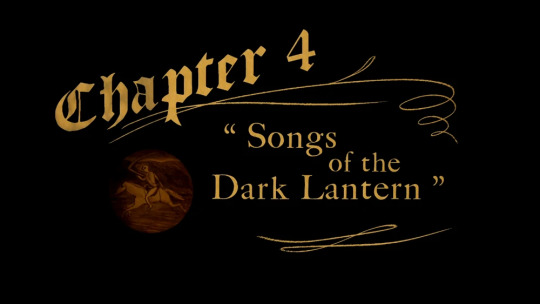
“...and don’t believe his lies.”
Schooltown Follies is about the essence of Greg. He’s goofy, so the story is goofy. He’s easily distracted, so none of the songs end. He’s confident and capable, so everything works out without him evolving. And he has bravery that largely stems from not understanding the dangers of the world, so the dangers are a mean old man who turns out to be nice and a scary gorilla who turns out to be a circus performer.
Songs of the Dark Lantern is about the essence of Wirt. He’s obedient to a fault, so the story is about asking for direction. He's figuring out who he is, so he’s surrounded by conflicting identities. He has virtually no confidence, so he needs a boost from a cheering crowd to become capable. And he misjudges situations constantly, so the dangerous Beast is introduced just to prove him wrong yet again about the Woodsman.

The mere threat of the Beast is enough to spur the carriage driver in our opening scene to veer his stowaways wildly off course, because spoiler alert the Beast is fear of the unknown personified. The episode continues without mention of the Beast for a good while from there, but after a whistling song and the Highwayman’s song (more on that soon, don’t worry), Beatrice hears a third song from the woods while waiting in the rain. In the moment, it’s just one more weird thing about the Unknown, and it’s a cheery operatic number, literally beginning with “La la la la.”
As Wirt is emboldened by the jolly crowd, he mentions the Beast for the first time since the carriage scene, and the merriment flits out of the room. Again, this monster’s reputation precedes him, but we still don’t know much about him. From the Woodsman’s description in The Old Grist Mill we know that he’s a he, that he sings like the four winds (uh oh!), and that he steals children. But his name is animalistic, and we’re primed by the cursed hound to see him as a creature of some sort, until one line from Tavern Keeper’s song changes everything: suddenly, almost off-handedly, we learn that the Beast is a liar.
No longer is the Beast a mysterious monster in the woods; we now know that he’s not only intelligent enough to speak, but that his danger comes from deception rather than sheer force. And immediately the Tavern Keeper continues to sing about the Beast’s connection to oil trees and lanterns, deceiving Wirt into suspecting the Woodsman. This isn’t to say the Tavern Keeper intends to mislead him, but deception shrouds every element of the Beast.
However, if we think the Woodsman is the Beast, it lessens our understanding of this deception. The point isn’t to fool us, but to show us the impact of the Beast’s aura of lies, so that we expect more subterfuge from him and his allies for the rest of the series. If the Woodsman’s innocence was presented as a twist at the end of the series, we not only would lose the more significant threat looming over the following episodes, but we wouldn’t understand until rewatch that our wanderers are going off faulty information. So instead of holding onto this card for later, we end the episode by meeting our villain, voiced magnificently by Grammy-winning operatic bass Samuel Ramey. As the Tavern Keeper implied, he certainly does talk, and his brief conversation confirms that while the Woodsman wasn’t telling us everything, he at least is on the side of the children.
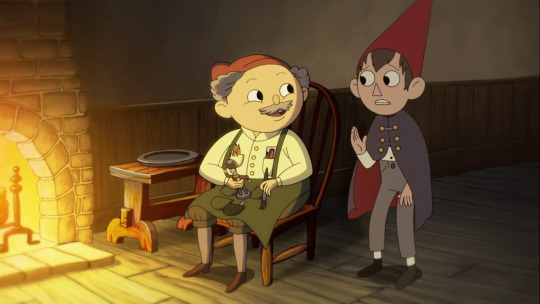
But the Beast isn’t our only singer today, which shouldn’t come as a shock in an episode called Songs of the Dark Lantern. While the influence of past cartoons and children’s literature is felt throughout the series, this is one of the two episodes where the sensation is most apparent: the musicality evokes 30s-era animated classics, but the cast and setting entrench us firmly in the Fleischer camp instead of the Silly Symphonies of Disney or the Merrie Melodies and Looney Tunes of Warner. There are plenty of distinctions between the three studios, but they’re best summarized by their mascots: Disney’s is a mouse, and Warner’s shuffled between a pig and a duck before settling on a rabbit, but Fleischer’s was a human flapper. Animation was never an exclusive children’s market, and Fleischer cartoons tended to lean a bit older.
So it’s not just that the Tavern Keeper looks and sounds like Betty Boop, or that the raindrops resemble film grain to evoke poor picture quality of the olden days, or that the Highwayman’s song shifts the animation to an impossibly smooth dance reminiscent of Cab Calloway’s spectral walrus in Minnie the Moocher (funny how both this episode and Hard Times at the Huskin’ Bee specifically reference spooky old cartoons instead of regular old cartoons). It’s that we’re in a tavern in the first place, an adult location that contrasts with the grade school of our last episode, and we trade a class full of funny animals with a pub that’s so human-exclusive that Beatrice is forbidden. This is a love letter to a bygone age, and it’s the episode that made me go from liking this miniseries to loving it.
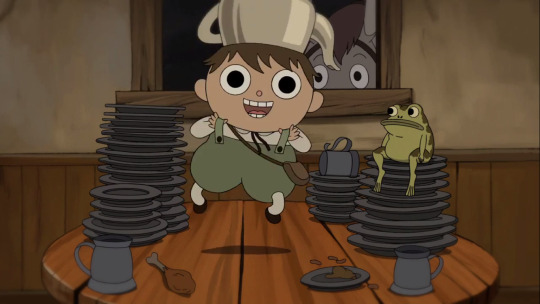
Greg returns to the sidelines, with a long-running and surprisingly quiet gag about sating the hunger he expresses in the carriage with dish after dish of food. And Beatrice has her moments, hanging out with a pre-verbal Fred the Horse and bristling at everyone around her: this includes laying a curse on the Tavern Keeper, which is funny at first while they discuss the luck of bluebirds but gains new meaning upon learning she actually was cursed by a bluebird.
Still, this is all about Wirt, who’s forced to be assertive when Beatrice is left out in the rain. And he tries, bless him, but the tavern’s group of weirdos cuts him off at every turn, presenting their distinct identities and forcing him to consider his own. While I appreciate his dithering from the first three episodes, a realistic portrayal of a neurotic teen who doesn’t like being on an adventure, it’s important that he grows over the course of the series. This is a big first step, because even if he doesn’t know who he really is by the end of the episode, he at least begins to think about it.
In the tavern, the patrons define themselves by their roles in society, so they’re otherwise as nameless as the animals of Schooltown Follies (except Jeffrey the Opossum, and call me crazy but I think Greg might’ve made that up). And to match the old-timey aesthetic and Frank Fairfield’s old-timey singing voice for the Toymaker, the patrons have old-timey jobs. We still have butchers and bakers and tailors and such today, but none of these careers would be out of place in a nursery rhyme or fairy tale. While this works on a tonally consistent level with the environment, it also displays how outdated the notion of identifying as just one thing really is.
While the patrons aren’t as bad as the Beast by any stretch, their cheerfulness hides a self-serving element that fits right in with the duplicitous world of the Unknown. The Highwayman is a straight-up criminal, whose dark song from Blind Boy Paxton and eerie Fleischerian dance casts a long shadow over the rest of the scenes in the tavern, but when the Toymaker thrusts the role of Lover upon Wirt to sing a song about all the people he’ll have to employ for a wedding, it feels like a lighthearted con job. Even if it was healthy to let others tell you who you are, these probably aren’t the people you want doing it.
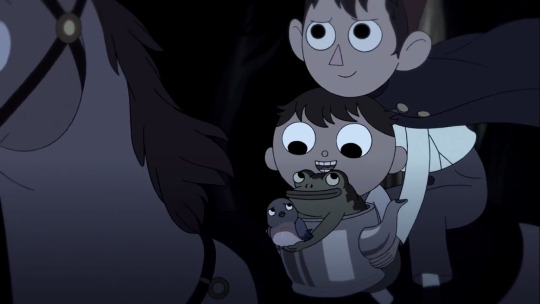
Wirt isn’t much of a pilgrim (or a singer), as there’s a critical religious factor to pilgrimages; like Odysseus and Dorothy before him, he’s just trying to get home. But as we might expect at this point, he’s thrilled to let someone else define him so that he doesn’t have to. This is an episode where he enters a tavern because he’s told to, then rescues his friend because he’s told to. But it’s still a step up! In The Old Grist Mill he completely fails to be useful, in Hard Times at the Huskin’ Bee his floundering only succeeds because he’s not in any danger, and in Schooltown Follies he reveals the gorilla as Jimmy Brown by tripping when ordered to do something. His progress is gradual, but this time his call to action is met by stealing a horse that he doesn’t know how to ride and giving chase into the woods despite his fear that the Beast is near. He puts himself in further danger to save Beatrice from the Woodsman, and it doesn’t really matter that the Woodsman isn’t a threat, because Wirt thinks he is and acts boldly anyway.
It’ll still be a while before he acts heroically by following the compass inside his heart, so for now this “pilgrim” does need directions. He’s not quite a hero, but here he’s like a hero (and stuff), and that’s not nothing. Disinformation abounds in the Unknown, and the only way for Wirt to defeat the master of lies is to truly believe in himself. He’s on his way, but this isn’t the end of that road.
Rock Factsheet
Here’s an actual fact: I didn’t realize until this rewatch how few Rock Facts we actually hear on this show. It sticks with you in retrospect, but on an episode-by-episode basis they’re incredibly sparse.
Where have we come, and where shall we end?
This is the episode where we casually learn that Wirt and Greg are half-brothers, which is a quiet but important factor in Wirt’s growth: we take as a given that they see each other as brothers, but he never actually refers to Greg as his brother without caveats until after our flashback in The Unknown.
In the “these are modern kids” report: Wirt thinks of pilgrims in relation to American Thanksgiving, which confirms him as a citizen of the real world.
110 notes
·
View notes
Text
Chapter 3: Schooltown Follies
Since there have been stories, there have been stories that anthropomorphize animals. Folks have imagined creatures behaving as humans in every corner of the world, in myths and fables and fairy tales from ancient cultures to today. So by the turn of the 20th century, when a mycologist known for painting incredibly detailed images of fungus decided to instead write and illustrate stories about animals in contemporary clothes, it wasn’t exactly a new idea. But perhaps that makes it more impressive: despite the multitude of animal books for children that have been published in the last hundred and fifty years, the work of Beatrix Potter still stands out.
She’s not alone, of course: no good conversation about humanized animals in Western kid lit can last long without mentioning Richard Scarry or Margaret Wise Brown or Arnold Lobel. And Peter Rabbit’s extended family is quite British, which puts it at odds with the nostalgic Americana of Over the Garden Wall: it’s not for nothing that our assortment of animals in Schooltown Follies includes a raccoon and an opossum. But the timeless quality of Potter’s work is still felt in this episode in two ways. First, while the show has a cartoony lens, the school animals are far more anatomically accurate than Beatrice or the frogs of Lullaby in Frogland, evoking Potter’s signature field guide style. And second, there’s a mischief to Potter’s animals that makes them feel more like real children than the cute but bland residents of Scarry’s Busytown, and mischief is the name of the game when Greg comes to schooltown.
Schooltown Follies is full of clever tricks, but perhaps its most clever is introducing animals with human qualities (they wear clothes, play instruments, and walk on their hind legs) but not giving them voices. It’s generally great comedy fuel, showing the inherent ridiculousness of a school for sorta normal animals, but it more importantly allows the episode a silent movie feel, with plenty of physical humor enhanced by characters without dialogue. That style completes the episode’s subversion of Beatrix Potter’s oeuvre: she wrote stories about naughty animals learning that they should behave, but in this vaudeville version, the only way to save the day is by misbehaving.
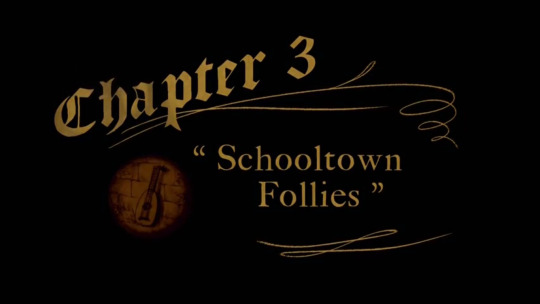
“Then I’ll do what I need to do, I guess.”
Despite being one of our three main characters, Greg trades a full character arc for a comic relief role. At the beginning of Over the Garden Wall he’s a chatty kid who never gives up and loves fun, and at the end he’s a chatty kid who never gives up and loves fun. This doesn’t mean he’s fully static, as he matures enough to accept some responsibility to others instead of seeking entertainment for himself: he abandons a potential happy ending to try to save Wirt with the Beast, and returns his stolen Rock Facts Rock in the last shot of the series. But even this obligation to help out is present early on: Schooltown Follies is the first of his two focus episodes, and the foundation of his eventual heroism is established right here.
And frankly? I think it’s okay if he’s not that dynamic. Greg doesn’t change as much as Wirt or Beatrice because he doesn’t have nearly as much to overcome, and he still contributes to the show without forcing the crew to juggle three distinct arcs. Our older kids are on a shorter timer to grow up, and have clearer negative traits (Wirt’s got no confidence, Beatrice is a jerk), and while we can accuse Greg of lacking social cues, he’s so young that it’s not indicative of a larger problem. He’s just acting his age, albeit in a heightened way for entertainment, and to lose that innocence this early in his life would make this show a serious downer.
“Heightened” is the general mood of Schooltown Follies, where Greg’s less realistic behavior fits much better than The Old Grist Mill’s bottom-of-the-barrel aside. This is an episode where Two Old Cat, an old-timey bat-and-ball game that evokes a similar old-school era as our old school, involves searching for actual old cats, somehow finding them immediately, then realizing one is too old to play and must instead be taken care of by a raccoon in a newsboy cap and overalls.

While there’s plenty of humor to go around in Over the Garden Wall, this is the only fully silly episode. Our other lighthearted outings come with dark twists: Songs of the Dark Lantern introduces the Beast, Lullaby in Frogland reveals Adelaide, and Babes in the Wood turns out to be the most somber episode of the series with context. Here we almost get a parody of such a twist, with characters repeatedly mentioning a wild gorilla on the loose apropos of nothing, then revealing that the gorilla is Miss Langtree’s paramour trapped in a suit. It’s a ridiculous setup to a ridiculous punchline, aided by casting Thomas Lennon for a few lines of dialogue (his read for “I. Was. The gorilla” was worth every penny), so there’s never any sense of danger. Jimmy Brown and Enoch are equally harmless in the end, but I doubt any little kids watching are gonna get nightmares about the ape suit.
This mood is enhanced with song, but among the many musical moments in the series—Mad Love is the only episode without singing in some form—Schooltown Follies stands out by not letting any of the numbers finish. We begin and end the episode in song, but Greg doesn’t have the last lines for Adelaide Parade figured out, Langtree’s Lament faces numerous interruptions before being cut short by the bell (they actually did a full version though!), and Potatoes and Molasses gets stopped first by Mr. Langtree, then by the end credits. Even Miss Langtree’s piano rendition of last episode’s Patient is the Night halts when Greg mashes the keys. It’s the perfect atmosphere for an episode about a kid who loves fun, but is easily distracted and hasn’t developed good planning skills.
Which isn’t to say that Greg is dumb, but that he’s prone to winging it in a way that sets him apart from Wirt. While Wirt rambles his thoughts aloud, Greg takes action without telling anyone why, making his decisions appear random in a medium that often explains motives concretely to young viewers. Wandering in his own direction has become a running gag by now, and while he sets off to make the world a better place, he instead plays outside with animal truants. He’s jolted back to his quest by the bland food and dull atmosphere of lunch hour, and his irrepressible energy lightens everybody’s day without much effort. When Mr. Langtree steps in as an antagonist, Greg decides once again to do something about it, this time saying explicitly that he has no plan, but everything works out again. We get an excellent joke from his decision to rob Langtree right after he becomes sympathetic, but as usual, Greg has bigger ideas behind the humor that he just hasn’t articulated.
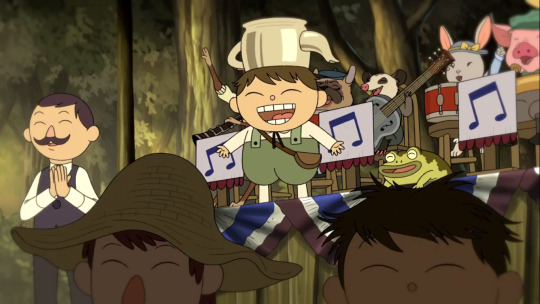
While Greg is busy delightfully saving the day, Wirt and Beatrice ease into a sniping side story that establishes their relationship for the next few episodes. They got off on the wrong foot in The Old Grist Mill and twisted that ankle in Hard Times at the Huskin’ Bee, so by now Beatrice doesn’t even try to hide her disdain and Wirt gets fed up with it. This is the perfect type of subplot, one that develops our characters and fits into the theme of the episode—Wirt’s rebellious obedience bounces off Greg’s rebellious call to disobey—but doesn’t distract from the main story.
Beatrice is helpful in opening up Wirt’s snotty side in a way that allows us to cheer for him. Until now his biggest conversation partner has been Greg, and it’s tough to side with Wirt when he’s mean to Greg, but Beatrice is an equal in terms of sparring, and her rudeness is a more understandable motive for Wirt to be obstinate than Greg’s playfulness. Our last episode had him aimlessly suggest staying in Pottsfield, and he’s similarly bound to this new location, but his different attitude changes the entire story. After two episodes of dithering, it’s nice that they let Elijah Wood play a character who’s funny on purpose for a spell, reveling in annoying Beatrice.
And even though he doesn’t know what to do, we actually get our first heroic moment from Wirt here. Greg saved the day in Grist Mill, and the situation resolves without much issue in Hard Times, but Jimmy is saved from the gorilla costume because of Wirt. True, he only interferes after being commanded to by Mr. Langtree, and he clearly has no idea what to do, and he trips over his shoelaces rather than contribute in an intentional way, but it sets the stage for his rescue of Beatrice in our next episode. Deep down, when he’s not overthinking it, the kid is capable of bravery when it’s asked of him. And it’s wonderful that for all his differences from Greg, both share an impulsive approach to heroism when they decide to help others. It’s almost like they’re related.
Beyond getting a few good digs in at Wirt, Beatrice extends her meanness to Miss Langtree, which makes her pestering of the boys feel less personal: it’s not that she hates them, she’s irritable with everyone. But we also get the first hint of her warming to our heroes, letting Greg have his fun at the concert and telling Wirt to finally tie his shoes with just a tiny speckle of fondness. While she gets a bigger friendship moment in Mad Love, when she’s essentially forced to get to know Wirt better, it’s neat to see Beatrice gradually come around instead of flipping a switch after a major story event.

We’re about to get our next big Plot Episode, introducing the Beast and adding new doubts about the Woodsman, so a silly episode is just what we need. It’s our third in a row where something sinister turns out to be okay: obviously the gorilla is an example of this, but Mr. Langtree is similarly an intimidating presence who ends up being a regular man. Even the creepy squirrels from the opening shots of the Unknown’s dangers in The Old Grist Mill return as comic relief. We’re fully primed to look for goodness where we see wickedness. Just in time for us to learn to fear merry opera echoing from the woods.
Rock Factsheet
Greg’s spiel on hot dogs might not summon the Rock Fact Rock, but it certainly evokes the stone’s spirit.
Where have we come, and where shall we end?
Adelaide Parade and Potatoes and Molasses will both get dark reprises, and the former also gets the rare jolly reprise as well. But we unfortunately don’t get a harrowing future scene featuring Langtree’s Lament.
Two Old Cat is part of a list of bat-and-ball games mentioned by a rambling background teen in The Unknown.
52 notes
·
View notes
Text
Chapter 2: Hard Times at the Huskin’ Bee
Ubbe Ert Iwwerks is not, despite the way it sounds when you say it in a dark room, an ancient and irreversible curse. It was the name of a boy born in Missouri in 1901, the sort of terminally Germanic name that makes “Ub Iwerks” maybe not sound so bad by comparison, so that’s what he went by when he started making cartoons.
Ub was just eighteen when he met a boy his age from Chicago at the Kansas City art studio where they both worked, and they became fast friends. They soon moved jobs together, becoming commercial illustrators at the Kansas City Slide Newspaper Company, but as technology advanced, the opportunity to make drawings come alive seemed too small for ads. Ub’s friend decided to jump into this new medium, and Ub followed suit, becoming the chief animator for Laugh-O-Gram Cartoons when he was twenty-one.
Laugh-O-Gram didn’t last very long, so Ub followed his colleague to Los Angeles to develop a series starring a live-action girl and a cartoon cat called the Alice Comedies. It was a moderate success, enough that Ub was tapped to design a character for Universal Studios to star in a new series of shorts. He created a cartoon rabbit that Universal loved, but big business being big business, the studio hired away most of the staff behind these cartoons, leaving Ub and his friend-turned-colleague-turned-boss high and dry. Determined to never paint another cel with a character he didn’t own the rights of, Ub’s boss roughly sketched out a new critter that Ub perfected and animated in a series of new cartoons.
(To be clear: by “animated,” I don’t mean he just directed animation or drew storyboards. Ub literally hand-animated the whole darn things, churning out cartoons at almost full-studio speed pretty much by himself.)
Anyway, the first such short his studio released, but the third produced, was called Steamboat Willie. And while it helped put Ub’s boss Walt and their character Mickey on the map, Ub would never see the same level of success. Because a big part of the story that I haven’t mentioned yet is that Walt, for all his incredible creative vision, wasn’t a tool so much as a toolbox.
Ub Iwerks would soon animate the very first Silly Symphony in 1929, The Skeleton Dance, featuring a growing group of skeletons emerging from a graveyard to, well, dance. Less famous is its 1937 sequel, animated by Iwerks after leaving Disney’s toxic work environment seven years earlier. Skeleton Frolic shows just how quickly the medium was evolving, featuring full color and far smoother animation. Ub would keep honing his art for the rest of his life, outliving his old friend by a few years but remaining a background figure in history despite his gigantic role in the founding of the most prominent entertainment empire in the world.
So while it’s laughable to imagine that a trained animator like Pat McHale would be unfamiliar with the iconic Skeleton Dance, it’s less of a given that Skeleton Frolic floats too high in his reference pool. I honestly don’t know either way for sure, but while Skeleton Dance is the classic, only its sequel features a moment where a skull is replaced with a pumpkin.

“Say, aren’t you a little too early?”
The Old Grist Mill had a lot on its plate: it needed to introduce our characters, their goal, the dangerous force that they must avoid, and the Unknown as a place. We ease off a bit for Hard Times at the Huskin’ Bee, so it feels a bit more like a “normal” episode, but it still pulls its weight by properly welcoming Beatrice to the party. After all, these episodes were released two at a time, so it makes sense to view both as the “first.”
Beatrice doubles down on that initial impression of a helpful bird with an attitude: she now takes the role of a small trapped animal that needs help in exchange for a favor, a staple of fables and myths that would prime us to see her as a traditional mystical guide if not for every single thing she says. She insists she’s not magical, and doesn’t even wait to be rescued before she starts grumbling at Greg and Wirt. Her advice to see Adelaide of the Pasture quickly morphs to hectoring when the boys decide to instead go to Pottsfield, casting doubt on the purity of her intentions. Again, we could’ve had a story where Beatrice feigned sweetness and her betrayal was a massive mid-series twist, but it’s so much better that we instead get consistent characterization throughout for our third lead.
Over the Garden Wall never forgets that the reason Beatrice is a bird in the first place is because she was a foul-tempered kid who threw a rock at another bird. We don’t know it now, but she’s actually the second character we see in the series (right after Jason Funderburker), a human with a dog glancing up at a bird flying through the branches. If nastiness is the cause of her curse, it makes little sense for her disposition to improve now that she has to eat maggots instead of waffles.
But she’s still a kid—meaning a teen, at this point I see everyone below the age of 25 as a “kid”—so she’s not evil so much as ornery. She’s also not slick enough to be a proper villain, regularly fumbling through her plans (her hesitant “That’s the...bluebird rules” is Melanie Lynskey’s best line reading of the episode) and outright telling Greg to ditch Wirt when subterfuge fails her. Her incompetence makes her a natural fit with the group, even and especially as she projects false wisdom.
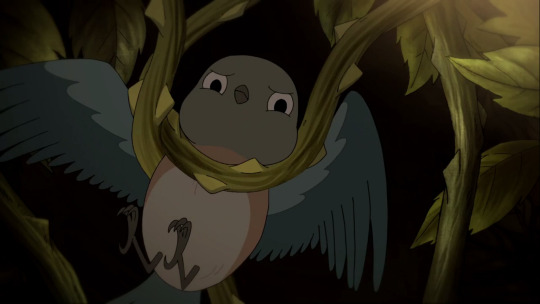
Over the Garden Wall is a story about the in-between, the stage between summer and winter, wakefulness and sleep, life and death. Through her name alone, Beatrice enhances this theme: she might not be as angelic as her namesake in the Divine Comedy, but she’s nonetheless a guide familiar with a strange afterlife helping souls that got lost in the woods. So it’s fitting that we learn her name in an episode explicitly about the dead from the perspective of two living boys who are eager to stay that way.
Wirt and Greg’s actual near-death experience that we’ll learn of in The Unknown colors the entire series, and Hard Times at the Huskin’ Bee thrives by showing that they’re not just traveling to the afterlife, but intruding upon it. The finality of death makes the residents of Pottsfield unaccustomed to temporary visitors, but our wanderers don’t belong there yet.
Because this is an adventure with horror elements rather than a full-on horror, the Pottsfielders don’t remedy the problem by trying to kill our heroes: in fact, everything just sort of works out. The pumpkinfolk are creepy, but they’re only having a celebration. Enoch is even creepier, but he’s a civic-minded leader whose punishment is light and fair. And even when we learn that the citizens are skeletons, it doesn’t mean they’re bad people. The only aspect of Pottsfield that’s actually worth being afraid of are the giant turkeys, because I mean yikes.
Nearly every episode of Over the Garden Wall involves a case of mistaken identity, because this is also a story about the nebulous nature of truth (and that’s a Rock Fact!). The Old Grist Mill has an unintentionally disguised figure in Beatrice’s dog, who’s easily confused for the Beast by two boys who don’t know any better. But here we get our first case of characters disguising themselves—the skeletons as pumpkins, and as we’ll learn much later, the black cat as Enoch—and it’s presented as unexpectedly wholesome. Lies abound in the Unknown, but remember, some of them are the loveliest lies of all.
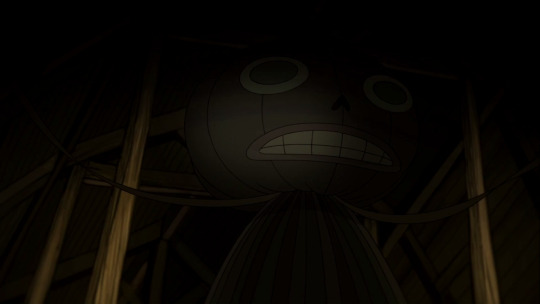
Still, knowing that Enoch and the gang are friendly doesn’t stop them from being unnerving, especially with Chris Isaak’s haunting voice thrumming from a giant painted face. It’s a necessary factor not only for the tone of the episode and series, but to provide a good portion of the episode’s humor: the sheer relief that nothing terrible happens is enough to lighten your mood (although a tiny ball and chain built for a bird also helps). We’ve now had two episodes where a threat turns out to be innocuous, a trend that will soon be met by innocuous-seeming characters turning out to be threats. Nothing is as it appears in the Unknown.
The ambiguity of Pottsfield has a fascinating effect on Wirt. In our last episode, he kept going back and forth about the Woodsman even when welcomed into the safety of a cabin and given the promise of help. Here, there are red flags galore in this weird pumpkin town, but Wirt’s uncertainty cedes to a stubborn insistence that everything is fine. It speaks to the writing team and Elijah Wood that this reversal feels totally natural: he’s still nervous and unsure of himself, and rather than having actual blind faith in the pumpkinfolk, his forced confidence is an overreaction to The Old Grist Mill. There, he didn’t trust a suspicious-looking stranger, and it ended terribly. Here he decides to listen to that stranger’s advice despite several safer-seeming alternatives in hopes of avoiding that mistake, and while all ends well, his lesson about being too wary is now joined by a lesson about being too trusting.
At the risk of writing a paragraph that’s meaningless to anyone who isn’t close enough to my age to have watched Digimon in the late 90s, Wirt’s attitude is delightfully similar to that show’s stick-in-the-mud, Joe Kido. One of the things that makes Digimon brilliant is that it’s a story about child heroes featuring actual realistic children, which means several of them really don’t wanna participate in a life-threatening adventure. As the oldest and most responsible member of the group (not to mention the ambitious son of a doctor, granting him exceptional medical knowledge for a kid), Joe is the natural choice to lead the team on paper. But he’s too reliant on real-world logic to function well in a wonderland, so his practical advice that would be super helpful in most situations (call for help whenever possible, conserve resources for a long journey, don’t throw yourself into dangerous situations) ends up making him a killjoy most of the time.
Wirt has a similar aversion to adventure, preferring safety over a quest bestowed by a talking bird. He follows the road and assumes the town they find will have someone who can help out, refusing to let the weirdness of Pottsfield deter him from this faith in simple solutions until Greg finds a skeleton. And even then, when he reacts reasonably and concludes that he’s digging his own grave, he’s proven wrong again. He follows the path of least resistance so rigidly that he contemplates just staying in Pottsfield rather than thinking up a new plan. Thankfully he’s in a safe enough neck of the woods that this attitude doesn’t get him or Greg hurt, and his missteps here allow him develop just enough savvy to survive as the going gets rougher.

Greg remains Wirt’s opposite, decisively following his own path to the point of straight-up ignoring his brother. Beatrice is often paired with Wirt while Greg does his own thing, but she and Greg get a ton of time together here. He’s the one that frees her in the first place, the one that she tells her name to, the one she dances with at the party (sidenote, Greg needs to be taught about consent), and the one she runs away with while Wirt stalls for time in the graveyard. It’s a fun dynamic, but a bit redundant when Greg has such a similar dynamic with Wirt, so it’s a wise move to have Beatrice bounce off the older brother more as the series continues.
There’s honestly not much more to say about Greg for now, except that he’s a far smoother version of comic relief than he was in The Old Grist Mill. The blithely accepting kid we see here is pretty much what we’ll get for the rest of the series, and he doesn’t even break out his rock. This isn’t to say he’s not a joy to be around, as his merry demeanor is a welcome change of pace from Wirt’s and now Beatrice’s negative outlooks and the frightening residents of Pottsfield, but there’s not much to analyze about him in Hard Times at the Huskin’ Bee. Even Wirt Junior has more character development, suddenly capable of doing human-like stretches after a stint of acting like a normal frog. But don’t worry, Greg gets plenty of focus in our next episode.
Just as The Old Grist Mill begins and ends with a silhouette of Beatrice among the branches (not counting the cold open, of course), Hard Times at the Huskin’ Bee begins and ends with a leaf. But there’s so much more of a story this time, because on top of the swelling strings and the lush fall colors, there’s a distinct change from beginning to end. We start by seeing the leaf break loose from a tree and blow away in the wind, and this moment is followed by birds flying south, a chirping cricket, and a troop of turkeys to establish a general autumnal tone. But those strings return during our last conversation, lingering on as we return to that leaf. All seems well as our heroes continue to wander, but the music starts to sour as the leaf gets caught in a fence, struggling to escape as we fade out.
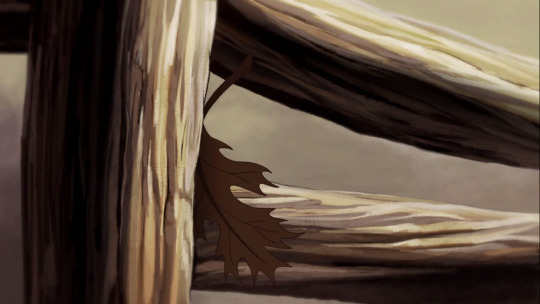
Wirt has shifted his hopes from the Woodsman’s bad directions to Adelaide, and Beatrice has hinted at a deeper backstory that she refuses to explain, and while both of these trails might end as simply as the Pottsfielders' happy celebration, that leaf tells a different tale. In a story about the exploring the in-between, there are few worse fates than getting stuck.
Rock Factsheet
No Rock Facts today, unless you count the Fact that Pottsfielders don’t like Rocks.
Where have we come, and where shall we end?
In the “these are modern kids” report: Wirt is looking for a phone.
In the “these kids have a very specific history” report: now that we have the regular introduction song that accompanies every episode but The Old Grist Mill, we can hear a train in the background just before the title card fades.
The Beast’s theme is heard in the dirge that plays while Enoch leads the Pottsfielders to the graveyard. It’s at least the first time it became distinct to me (because it sounds like the definitive Batman theme), but it’s actually very quietly present when the Woodsman discusses the Beast in The Old Grist Mill as well.
51 notes
·
View notes
Text
Chapter 1: The Old Grist Mill
2014 was a rough year.
I’d moved to New York City two Septembers earlier, fresh out of college and looking to break into children’s publishing. I took a job and made a healthy work family at a small children’s bookstore, and scrambled through internship after internship, working six- and seven-day weeks, until I finally became an editorial assistant in March of 2014.
Despite being where I’d worked my ass off to be, doing what I’d moved from Virginia to New York to do, I was deeply unhappy and the job wasn’t clicking. Considering I trudged through a depression in my teens that thinned in my early twenties but never went away, I figured it was something wrong with my head. It would be a year or so before I realized the bigger problem was that I love talking with kids and parents about books, and I don’t love working in an office environment. Either way, I didn’t last six months.
On the first of September, exactly five years before publishing this post, I moved out of my apartment (where my half of the rent had jumped $200) to couch surf while job hunting. I’d dragged all my stuff into storage during August, by far the worst month in New York, and was free to settle into a new phase of broke and grieving. I still thought I wanted to do publishing, deciding that the place where I’d worked was the problem rather than the career itself, but applying to jobs had been brutal enough without the shame of absolute failure to go with it. I still tried, but as is typical for anyone seeking a job in publishing, was met with total silence.
I only had one thing to look forward to. That June, while I was still employed, I’d nabbed a weekend ticket to my very first Comic Con, and despite having run out of money for non-essentials by October, the ticket was already bought. I spent three days taking my mind off everything wrong, and it will probably always be the best convention experience of my life. Super Smash Bros for 3DS was one of my last indulgences, and here were nerds galore to play with in lines. I saw the legendary Andrea Romano talk about her career as a voice director, then Kevin Conroy, one of her greatest performers, at a panel celebrating 75 years of Batman. I was one of the first people to see Daredevil, presented by producer Jeph Loeb, so on top of watching an amazing first look I got to see the writer of The Long Halloween, the greatest Batman story ever written (Loeb is very far from perfect but it was still a hell of a thing). I made Scott Aukerman chortle at a Comedy Bang Bang panel, and got hooked on the Thrilling Adventure Hour right when I needed hours upon hours of free entertainment the most.
In the middle of it all, I checked out a Cartoon Network panel; it was right after Mirror Gem blew up Steven Universe, so I was pumped to see some of the crew and a preview for Island Adventure. But this was one of many shows to be featured, and after Steven Universe and a clip from an upcoming Adventure Time, the lights dimmed further, and in a hushed room of hundreds, I saw my first two minutes of Over the Garden Wall.

“You’re more lost than you realize.”
The difference between a good mystery and a great one is how much you can get from the story when you already know how it ends. By that metric, Over the Garden Wall is a masterpiece.
Despite having more weaknesses than any other episode, The Old Grist Mill thrives off the unknown. Right from the start, after watching a frog play a frog-sized piano and smile at the camera, we get a series of bizarre and unrelated vignettes, transitioning with little fanfare until we reach the title card. The montage is accompanied by the incredible voice of Jack Jones, whose career had spanned fifty-five years by 2014 (and is still going strong in 2019); he somehow sings as smoothly in his seventies as he did in the sixties, and his song begins with the echoes of spring and ends as autumn colors fall. He switches to spoken word after the title card, where we get a glimpse of imperceptible figures floating in the water before we finally enter the woods, and it all happens so fast that we forget all about it by the end of the episode.
Over the Garden Wall is dreamlike throughout, but the sensation is never stronger than this opening sequence. Even though we get an actual dream episode in Babes in the Wood, and the entire Unknown is ambiguously a land of dreams, our introduction is the kind of dream that we lose track of after starting our day but suddenly remember as we’re going to sleep. It feels real in a way stereotypical prophetic or allegorical dreams in fiction don’t, and that tenuous tone of realistic strangeness persists for the rest of the series.

We’re not alone in the sensation, as after we hear a rambling list of bad frog names from a small child, an older one stops and points out that the two aren’t just lost, but have no memory of arriving in the gorgeous forest they’re wandering through. Like a dream, there’s no beginning here, just a set of weird circumstances that these brothers find themselves in, and their unease helps us more easily accept that one has a red dunce cap and the other is wearing a kettle for a hat.
We get used to Greg and Wirt’s strange appearance soon enough, but their introduction after the abstract opening tells us quickly that casual uncanniness will be par for the course in this world. This in turn allows us to quickly characterize our heroes: Greg is go-with-the-flow, embracing and adding to the weird, while worrywart Wirt asks rational questions about where they are and how a bluebird can talk. This contrast is enhanced by their outstanding voice actors: Collin Dean was seven at the oldest when recording these lines, a young talent brimming with excitement, while Elijah Wood, a veteran actor who also got his start at a young age, is able to convey the more nuanced dithering of an anxious teen.
And boy, does he dither. Wirt is the better-realized of the pair at the start, likely because it’s easier to realistically portray a bundle of nerves than an unusually fearless child. He’s a bit much, delving into melodramatic poetry twice in a way that doesn’t get much follow-through as the series continues, but Wirt is consistently “a bit much” in other capacities (and I’m honestly glad there aren’t poetry breaks in every episode). Wood excels at weighing his options a mile a minute before failing to come to an actual conclusion, undermining any notion that his caution is a sign of maturity. He blames his little brother for their plight, and is limber enough for his foot to live in his mouth, but is too fragile and sincere to get too mad at.

Greg is more of a mixed bag. We get a lot of what makes him great here: he’s goofy, he’s innocent, and he’s brave, but mostly because he isn’t old enough to realize how much danger he might be in. He’s obnoxious in a way that’s usually entertaining, blind to social cues but genuinely too young to know better. Most of the time, I love the kid. But The Old Grist Mill feels like a rough draft of Greg that tries too hard to tell us he’s an oddball.
Both brothers are chatty in their own way throughout the series, but Greg’s inability to stop talking here makes him appear far more annoying than he ends up being. For me, the frustration comes to a head when he first encounters the monster dog: his narration to nobody is only a little cloying as he searches for his frog, but after falling into a barrel and coming face to face with the snarling animal, he completely loses me with “You have beautiful eyes.”
It’s not just that the joke doesn’t click with me (and it really doesn’t, it’s by far my least favorite joke in the series), but it’s hard to tell what the line is even trying to convey. On paper it seems like Greg is laughing in the face of danger, but he’s clearly terrified. It might be a nervous reaction to fear, but from now on he’s shown to have unnatural bravado when confronting the horrors of the Unknown. All it does for me is confirm that Greg is wacky, but even this early on, this has already been established in far funnier ways, and in ways that make sense for a real child.
Lack of realism is a tricky thing to criticize such a surreal show for, but “You have beautiful eyes” temporarily transforms Greg from an actual weird kid in a strange situation into an exaggerated character with no tether to how any kid would react. Spanking the monster while shouting “Spank” a scene later goes in the opposite direction, showing that he’s suddenly not afraid of the monster to the point of making a game out of fighting it, and nothing prompts this wild shift in character besides the humor necessitating it. There’s nothing wrong with his heightened moments if they fit the mood (see: Potatoes and Molasses), but inconsistency throws off the delicate balance required for a precocious youngster.
Again, Greg is normally awesome, and I’m grateful these moments of weak characterization are limited to the first episode. Even in The Old Grist Mill, he’s got more hits than misses. But his attitude is jarring to return to upon rewatch, and it’s the main reason why this is my least favorite episode of Over the Garden Wall. Which isn’t saying much, given I love the entire series, but it’s still worth noting that it only gets better from here.
(As ever, if you liked this aspect of Greg, I’m happy you got more out of the episode than I did. Begrudging folks for liking things you dislike is very dumb.)
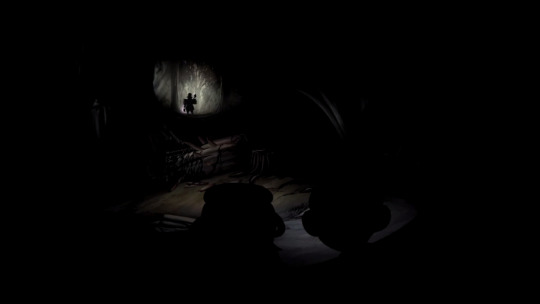
Christopher Lloyd is another big-name talent in the voice booth, and his Woodsman bears the burden of shoving plot details at us. His speechifying should be tedious, especially when rewatching, but The Old Grist Mill uses a few clever tricks to flip clumsy exposition from a weakness to a strength.
First, the Woodsman’s reliability is questionable, which allows the boys to go back and forth on whether to trust him and allows the viewers to take his advice with a grain of salt. Second, Lloyd’s grizzled voice has a quavering quality that makes it obvious that he’s scared of something and is very serious about it, but this fear clouds the specifics of this danger; the direct nature of his information is offset by the character not being great at direct communication. Third, when we do learn more about his backstory in later episodes, his warnings shift from odd to heroic, as despite his terror he’s desperate to save Greg and Wirt from sharing his miserable fate. We had to get this information somehow, and frontloading it while allowing it to characterize the speaker is a masterful way of getting through it.
The boys’ split reactions to the Woodsman are a defining moment, as Greg suggests talking to him and Wirt shoots down the idea, only to change his mind when it’s too late. But I love that we don’t stay entirely on this track: Wirt’s suspicions fade into passive acceptance, and while Greg seems to ignore his brother, his strange behavior is actually his way of prepping for Wirt’s fleeting plan to knock out their benefactor, which is implemented at the worst possible time. The Woodsman isn’t the only poor communicator here: most of the episode’s conflicts could’ve been resolved before they even began if these three were more trusting and capable of speaking clearly, but then we wouldn’t have a show about flawed wanderers growing up.

Our third wanderer only has a minor speaking role, but as I mentioned before, Beatrice is a great introduction to the oddness of the woods and the boys as characters unused to oddness. I love that she’s snappy pretty much right away; she tries the helpful guide shtick at first, but immediately gets defensive over Wirt’s rude response. We could’ve had her selfish intentions revealed as a mid-series twist, but instead it’s clear from the start that she’s not the friendliest of animal friends. It’s for the best that she doesn’t join right away, as what’s important now is a firm understanding of the brothers, but this short scene and her silhouette at the beginning and end of the episode are enough that she doesn’t pop in out of nowhere in Hard Times at the Huskin’ Bee. We also get our first taste of her heartbreaker of a theme, which I’m always here for.
And of course there’s our fourth wanderer, and second animal, the very first character we meet in the series. Jason Funderburker (not to be confused with Jason Funderberker) won’t be revealed as the singer of our opening song until the end of the series, and with a major exception he’s otherwise a wordless companion to the team. After playing the piano for us in the prologue, he’s refreshingly non-anthropomorphic in the episode proper: we already have one talking animal and the uncanny is everywhere, so there’s a welcome mundanity to a regular frog doing regular frog things until we get our bearings. He’s still special, putting up with Greg far more than an actual wild animal would, but a lesser show might have him distract from the primary characters with wacky antics.
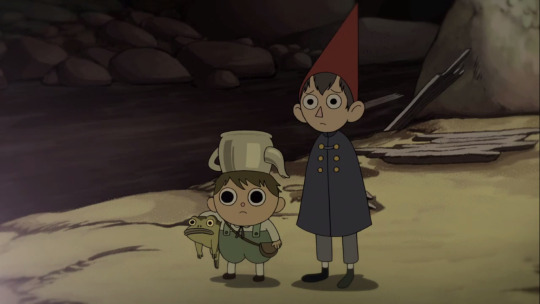
Wacky antics are the basic plot of The Old Grist Mill once the boys enter the cabin, and I appreciate that Greg saving the day is offset by his responsibility for leaving behind a candy trail in the first place. Wirt shows that his hidden depths are too deep to be seen in this dangerous situation; he does have a grasp on the importance of keeping Greg safe, but is happy to berate him without offering much help. Similarly, he knows the right thing to do would be helping clean up the mess they made, but then acknowledges his inability to help. His flaws are much more obvious than Greg’s, and he gets called out on them fast as the Woodman bemoans his misfortune.
From there it’s a call to action (be responsible, go north, beware the Unknown, fear the Beast, leave the woods, and give the frog a name) and our brothers hit the road. Wandering is critical to Over the Garden Wall’s magic, as it not only gives our heroes a natural avenue for regular adventures, but lets us see more and more of this stunningly beautiful world. I mean, just look at this:
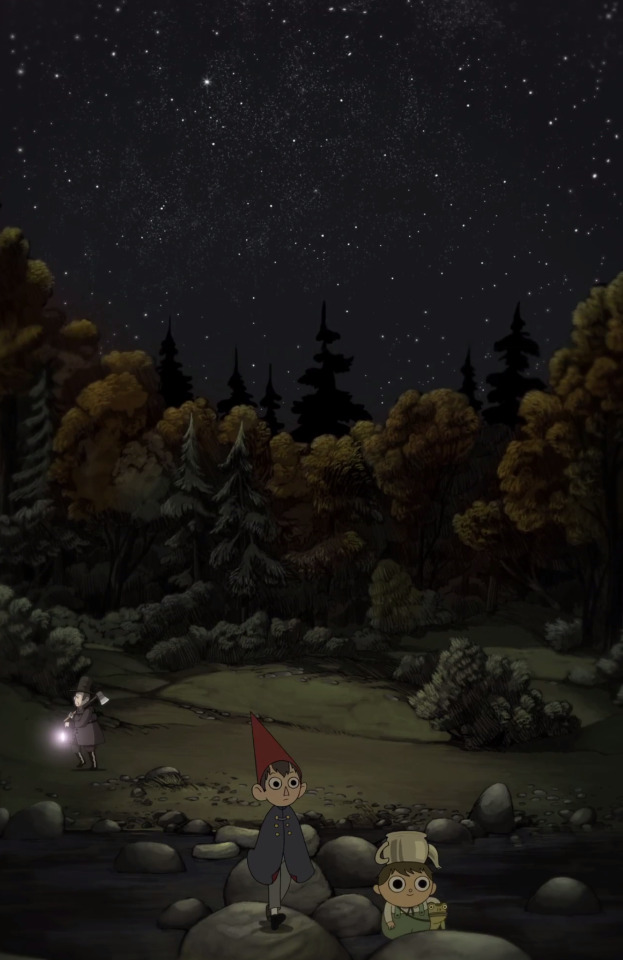
I’m gonna be focusing more on the story than the visuals while Going Over the Garden Wall, but this is only because my general comment on the visuals is “wow” and I don’t think I can do written justice to them beyond “wow” in most cases. Even if the story of Over the Garden Wall was awful, it would be worth the watch for the sheer spectacle of it all. That the story is decidedly not awful is an excellent bonus.
Rock Factsheet
If you soak a raisin in grape juice, it turns into a grape.
Where have we come, and where shall we end?
Unless you count their strange garb, which I think is more of a mystery than foreshadowing, Greg’s stash of candy is our first clue that these are relatively modern kids dressed for Halloween.
The opening montage is the most obvious connection between the first episode and the last, but I love the echo of “Everyone has a torch to burn, and this here’s mine.”
59 notes
·
View notes